Craftsman 32028191 User Manual CIRCULAR SAW Manuals And Guides L0902015
CRAFTSMAN Saw Circular Manual L0902015 CRAFTSMAN Saw Circular Owner's Manual, CRAFTSMAN Saw Circular installation guides
User Manual: Craftsman 32028191 32028191 CRAFTSMAN CIRCULAR SAW - Manuals and Guides View the owners manual for your CRAFTSMAN CIRCULAR SAW #32028191. Home:Tool Parts:Craftsman Parts:Craftsman CIRCULAR SAW Manual
Open the PDF directly: View PDF ![]() .
.
Page Count: 32

5=1/2OinoOircuSar Saw
Model No. 320°28191
_k CAUTION! Read, understand and
follow aH Safety Rules and Operating
gnstructions in this Manual before
using this product.
o Warranty
oSafety
°Operation
°Manntenance
Sears, Roebuck and Coo, Heffman Estates, IL 60&79
www.craftsrnan,com

Warranty Page 2
Safety Symbols Page 3-4
Safety Instructions Page 5-12
Glossary of Woodworking Terms Page 13
Know Your Circular Saw
.Unpacking
Operation
Maintenance
Parts List and Exploded View
Page 14-15
Page 15-16
Pages 16 - 23
Pages 24 - 25
Pages 26 - 29
ONE YEAR FULL WARRANTY ON CRAFTSMAN@ PRODUCT
tf this Craftsman tool fails to give complete satisfaction within one year
from the date of purchase, return it to any Sears store or other Craftsman
outlet in the United States for free replacement.
This warranty does not include parts, such as saw blades,that can wear
out from normal use within the warranty period.
This warranty applies for only 90 days from the date of purchase if this
product is ever used for commercial or rental purposes.
This warranty gives you specific legal rights, and you may also have other
rights, which vary from state to state.
Sears, Roebuck and Coo, Hoffman Estates, 1L 60179
,& WARNING: Some dust created by using power tools contains chemicals
known to the state of California to cause cancer and birth defects or other
reproductive harm.
SAVE THESE iNSTRUCTiONS!
READ ALL BNSTRUCTIONS!
28191 ManuaLRevised 07-0202 Page 2

The purpose of safety symbols is to attract your attention to possible dangers. The
safety symbols, and the explanations with them, deserve your careful attention and
understanding° The symbol warnings DO NOT by themselves eliminate any dan-
ger. The instructions and warnings they give are no substitutes for proper accident
prevention measures°
WARNING: BE SURE to read and understand all safety alert symbols such
as "DANGER," "WARNING," and "CAUTION" BEFORE using this product. Failure
to follow all instructions may result in electric shock, fire, and!or serious personal
injury.
SYMBOL MEANINGS
_k SAFETY ALERT SYMBOL: Indicates DANGER, WARNING, OR CAUTION°
May be used in conjunction with other symbols or pictographs..
DANGER: Failure to obey this safety warning WILL result in death or serious
injury to yourself or to others. Always follow the safety precautions to reduce the risk
of fire, electric shock and personal injury.
WARNING; Failure to obey this safety warning CAN result in death or serious
injury to yourself or to others. Always follow the safety precautions to reduce the risk
of fire, electric shock and personal injury,
CAUTION: Failure to obey this safety warning MAY result in personal injury
to yourself or others or property damage. Always follow the safety precautions to
reduce the risk of fire, electric shock and personal injury.
DAMAGE PREVENTION AND INFORMATION MESSAGES
These inform the user of important information and/or instructions that could lead
to equipment or other property damage if they are not followed° Each message is
preceded by the word "NOTE," as in the example below:
NOTE: Equipment and!or property damage may result if these instructions are not
followed.
Z_ WARNING: The operation of any tool with a circu-
lar blade can result in foreign objects being thrown into
your eyes, which can result in severe eye damage. Before
beginning power tool operation, ALWAYS wear safety
goggles or safety glasses with side shield and a full-face
shield when needed_ We recommend a Wide Vision Safety
Mask for use over eyeglasses or standard safety glasses
with side shield, available at Sears Stores or other Crafts-
man Outlets.
28191 ManuaLRevised_07_0202 Page 3

Some of these following symbols may be used on this tool. Please study them and
learn their meaning, Proper interpretation of these symbols will allow you to operate
the tool better and more safely°
SYMBOL NAME DESIGNATION /EXPLANATION
v Volts Vottage
A Amperes Current
Hz Hertz Frequency(cycles per second) ....
....
w Watt r Power
min Minutes Time
'%, Alternating Current Type of current
Direct Current Type or a characteristic of current
• , • ..... ,., ......... =
no No Load Speed Rotational speed, at no load
[] Class II Construction Double-insulated construction
! ................................
= •
.....imin Per Minute Revolutions, strokes, surface speed,
orbits, etc., per minute
Wet Conditions Alert Do not expose to rain or use in damplocations°
O To reduce the risk of injury, user must
Read the Product Manual read and understand product manual
before using this product,,
Q Always wear safety goggles or safety
Eye Protection glasses with side shields and a full-face
shield when operating this product.
Safety Alert Precautions that involve your safety.
__ .............. .,. ...... . ,,, ..... .... = , ....
Failure to keep your hands away from
No Hands Symbol the blade will result in serious personal
. injury.
Failure to keep your hands away from
No Hands Symbol the blade will result in serious personal
injury,.
@
®
No Hands Symbol
No Hands Symbol
Hot Surface
Failure to keep your hands away from
the blade wilt result in serious personal
injury.
Failure to keep your hands away from
the blade will result in serious personal
injury,.
To reduce the risk of injury or damage,
avoid contact with any hot surface.
28191 Manual Revised 07_0202 Page 4

_k WARNING: BE SURE to read and understand all instructions in this product
manual. Failure to follow all instructions may result in electric shock, fire and/or seri-
ous personal injury.
Z_ WARNING: All repairs should be performed by a qualified service technician
at a Sears Service Center to ensure safety and reliability.
Before using the circular saw, read the accompanying Safety Instructions carefully
and thoroughly, and keep all of the documents supplied with the tool in a safe place°
SAFETY PRECAUTIONS FOR LASERS
WARNING: Always follow the instructions contained in this manual when
using the laser. Use of this feature in any manner other than that which appears in
this manual may result in a hazardous radiation exposure,.
This circular saw has a built-in laser light. The laser is a Class ilta and emits out-
put power of a maximum 2.5mW and 635_665nm wavelengths. These lasers do
not normally present an optical hazard. However, DO NOT stare at the beam as
this can cause flash blindness°
The label opposite is on your tool. It indicates
the location from which the saw emits the
laser light, BE AWARE of the laser light loca-
tion when using, ALWAYS MAKE SURE that
any bystanders in the vicinity of use are made
aware of the dangers of looking directly into
the laser°
_k WARNING: LASER LIGHT. LASER RADIATION. Avoid Direct Eye Exposure.
DO NOT stare into beam_ Only turn laser beam on when the saw is on the work-
piece. Class ltla laser.
WARNING: Use of controls, adjustments or performance of procedures oth-
er than those specified in this manual may result in hazardous radiation exposure.
WARNING: The use of optical instruments such as, but not limited to, tele-
scopes or transits to view the laser beam will increase eye hazard.
1. 13o not remove or deface any product labels, Removing product labels
increases the risk of exposure to laser radiation.
2. Avoid direct eye exposure, The laser beam can be harmful to eyes Do not
look directly into the laser-beam-output aperture during operation. Do not
project the laser beam directly into the eyes of bystanders. Turn the laser on
only when making cuts.
3. The laser on the saw is not a toy, Always keep it out of the reach of chil-
dren. The laser light emitted from this device should never be directed
towards any person for any reason.
28191 Manual Revised_07-0202 Page 5

P
5_
6_
8_
g,
Be sure the laser beam is aimed at a work piece that does not have a
reflective surface, such as wood or a rough-coated surface. Reflective sur-
faces can reflect the laser light into your eyes, causing flash blindness
Do not use on surfaces such as sheet steel that have shiny, reflective
surfaces. The shiny surface could reflect the beam back at the operator. Be
aware that laser light reflected off a mirror or any other reflective surface can
be dangerous,
Always turn the laser beam off when not in use. Leaving the tool on in-
creases the risk of someone inadvertently staring into the laser beam.
Do not attempt to modify the performance of this laser device. This may
result in a dangerous exposure to laser radiation°
Use only accessories that are recommended by Sears. Use of other ac-
cessories that have been designed for use with other laser tools could result
in serious injury.
For further information regarding lasers, refer to ANSI-Z136.1, the standard for the
safe use of lasers, available from the Laser Institute of America (407) 380-1553,
WORK AREA SAFETY
1. Keep the work area clean and well tit. Cluttered benches and dark areas invite
accident&
37
4.
,
.
Don't use in adangerous environment, Don't use power tools in damp or wet
locations or expose them to rain. Do not operate power tools in explosive at-
mospheres, such as in the presence of flammable liquids, gases or dust. Power
tools create sparks which may ignite the dust or fumes.
Operate the tool in wellwentilated areas, and provide proper dust removal.
Dust generated from some materials can be hazardous to your health° Use dust-
collection systems whenever possible°
Keep children and bystanders away while operating a power toot. Distractions
cause you to lose control.
Use the right tool. Don't force a tool or attachment to do a job for which it was
not designed.
Make the workshop kid-proof with padlocks, master switches, or by removing
starter keys°
ELECTRICAL SAFETY
1. Do not change the plug in any way. This circular saw is a double-insulated too!,
Double insulated tools are equipped with a polarized plug (one blade is wider than
the other.) This plug will fit in a polarized outlet only one way. If the plug does not
fit fully in the outlet, reverse the plug. If it still does not fit, contact a qualified elec-
trician to install a polarized outlet. Do not change the plug in any way.
2. Double insulation[_eliminates the need for the three-wire grounded power cord
and grounded power supply system. Applicable only to Class II (double insulated)
tools.
28191 Manual_Revised 0743202 Page 6

3. ALWAYS avoid body contact with grounded surfaces, such as pipes, radia-
tors, ranges and refrigerators. There is an increased risk of electric shock if
your body is grounded
4o Do not expose power tools to rain or wet conditions. VVater entering apower
tool will increase the risk of electric shock.
,
.
When operating a power tool outside, ALWAYS use an outdoor extension
cord marked "W-A" or "W". These cords are rated for outdoor use and reduce
the risk of electric shock°
Do not abuse the cord, Never use the cord to carry the tools or to pull the
plug from the outlet. Keep the cord away from heat, oil, sharp edges, or moving
part& Replace damaged cords immediately. Damaged cords increase the risk of
electric shock.
7o Use the proper extension cord.
o Make sure that your extension cord is in good condition.,
o When using an extension cord, be sure to use one heaw enough to carry the
current your product wilt draw, An undersized cord wilt cause a drop in line
voltage, resulting in loss of power and overheating,,
,,Table A shows the correct size to use, depending on cord length and ampere
rating. If in doubt, use the next heavier gauge: the smaller the gauge number,
the heavier the cord°
o When operating a power tool outdoors, ALWAYS use an outdoor extension
cord marked "W-A" or "W.," These cords are rated for outdoor use and reduce
the risk of electric shock.
Volts
120V
- Ampere Rating
More than 0
Not more than 6
More than 6
Not more than 10
More than 10
Not more than 12
More than 12
Not more than 16
Minimum Gauge for Extension Cords
Total Lenghth of Cord in Feet
0-25ft. 25-50ft. 51-100fti .....10i-150ff.
AWG AWG AWG
16 16
16 .14
16 14
AWG
16
16
I6
14 I2
14
12
12
I ......
Not Recommended
PERSONAL SAFETY
WARNING: Use of this tool can generate dust containing chemicals
known to the state of California to cause cancer, birth defects, or other
reproductive harm. Some examples of these chemicals are:
o Lead from lead-based paints.
o Crystalline silica from bricks, cement, and other masonry products,
28191 Manual Revised 0743202 Page 7

o Arsenic and chromium from chemically treated lumber.
Your risk from these exposures varies, depending upon how often you do this
type of work. To reduce your exposure to these chemicals:
= Work in a well-ventilated area.
o Work with approved safety equipment, such as those dust masks that are
specially designed to filter out microscopic particles.
Avoid prolonged contact with dust from power sanding, sawing, grinding,
drilling, and other construction activities. Wear protective clothing and wash
exposed areas with soap and water.
Allowing dust to get into your mouth or eyes or to tie on the skin may promote
absorption of harmful chemicals.
WARNING: The operation of any power tool can result in foreign objects be-
ing thrown into your eyes, which can result in severe eye damage. Before begin-
ning power-toot operation, always wear safety goggles or safety glasses with side
shields, and a full face shield when needed. We recommend Wide Vision Safety
Mask for use over eyeglasses or standard safety glasses with shields. Always use
eye protection which is marked to comply with ANSI Z87.1
In
2_
3_
Stay alert, watch what you are doing and use common sense when op-
erating a power tool, Do not use a power tool while you are tired or under
the influence of drugs, alcohol or medication. A moment of inattention while
operating power tools may result in serious personal injury.
Dress properly. Do not wear loose clothing or jewelry. Keep your hair, clothing
and gloves away from moving parts. Loose clothes, jewelry or tong hair can be
caught in moving parts.
Avoid accidental starting, Ensure the switch is in the off position before
plugging in. Carrying power tools with your finger on the switch or plugging in
power tools that have the switch on invites accidents.
4o Remove adjusting keys or switches before turning the tool on. A wrench or a
key that is left attached to a rotating part of the tool may result in personal injury.
5. Do not overreach. Keep proper footing and balance at all times. This enables
better control of the power toot in unexpected situations.
.
.
8.
Use safety equipment. Always wear eye protection. Safety equipment such
as dust masks, non-skid safety shoes, hard hat or hearing protection used for
appropriate conditions will reduce personal injurie&
Wear hearing protection to help prevent hearing loss.
Never touch the pins of the electrical plug while inserting it into or removing it
from an electrical socket.
TOOL USE AND CARE SAFETY
_k WARNING: Use of accessories that are not recommended for use with this
tool may create hazardous conditions.
28191 Manua! Revised 07-0202 Page 8

1_ Keep guards in place and in working order,
2. Avoid accidental starting. Be sure the switch is in the "Off" position before
plugging the tool into an electrical outlet.
3. Do not carry tools with your finger on the switch.
4_ Use clamps or another practical way to secure and support the workpiece
to a stable platform. Holding the work by hand or against your body leaves it
unstable and may lead to loss of control.
54
6_
Do not over reach. Keep proper footing and balance at al! times_
Do not force the tool. Use the correct tool and blade for your application. The
correct tool and blade will do the job better and more safely when used at the
rate for which it is designed_
7. Do not use tool if the switch does not turn it "ON" or "OFF," Any toot that
cannot be controlled with the switch is dangerous and must be repaired.
8. Disconnect the plug from the power source and/or the batter pack from
the power tool before making any adjustments, changing accessories or
storing power tools. Such preventive safety measures reduce the risk of starting
the power tool accidentally.
9. Store idle power tools out of the reach of children and do not allow persons
unfamiliar with the power tool or these instructions to operate the power tool.
Power tools are dangerous in the hands of untrained users.
10o Do not allow persons unfamiliar with the power tool or these instructions
to operate this tool.
11oNever leave the tool r_Jnning unattended; turn the power off. Don't leave the
tool until it comes to a complete stop.
12. Always maintain tools with care. Keep cutting tools sharp and clean° Properly
maintained tools with sharp cutting edges are less likely to bind and are easier to
control° Follow all instructions for lubricating and changing accessories,
13. Check for damaged parts. Before further use of the tool, a guard or other part
that is damaged should be carefully checked to determine that it will operate
properly and perform its intended function° Check for alignment of moving
parts, binding of moving parts, mounting, and any other conditions that may
affect its operation. A guard or other part that is damaged should be properly
repaired or replaced.
!4. Use recommended accessories. Consult the product manual for recom-
mended accessories. The use of improper accessories may increase the
risk of personal injury.
15. Use the saw, blades, etc. in accordance with these instructions and in the
manner intended for the saw, as described in this manual, taking into account
the working conditions and the nature of the work to be performed.
28191 ManuaLRevised 0743202 Page 9
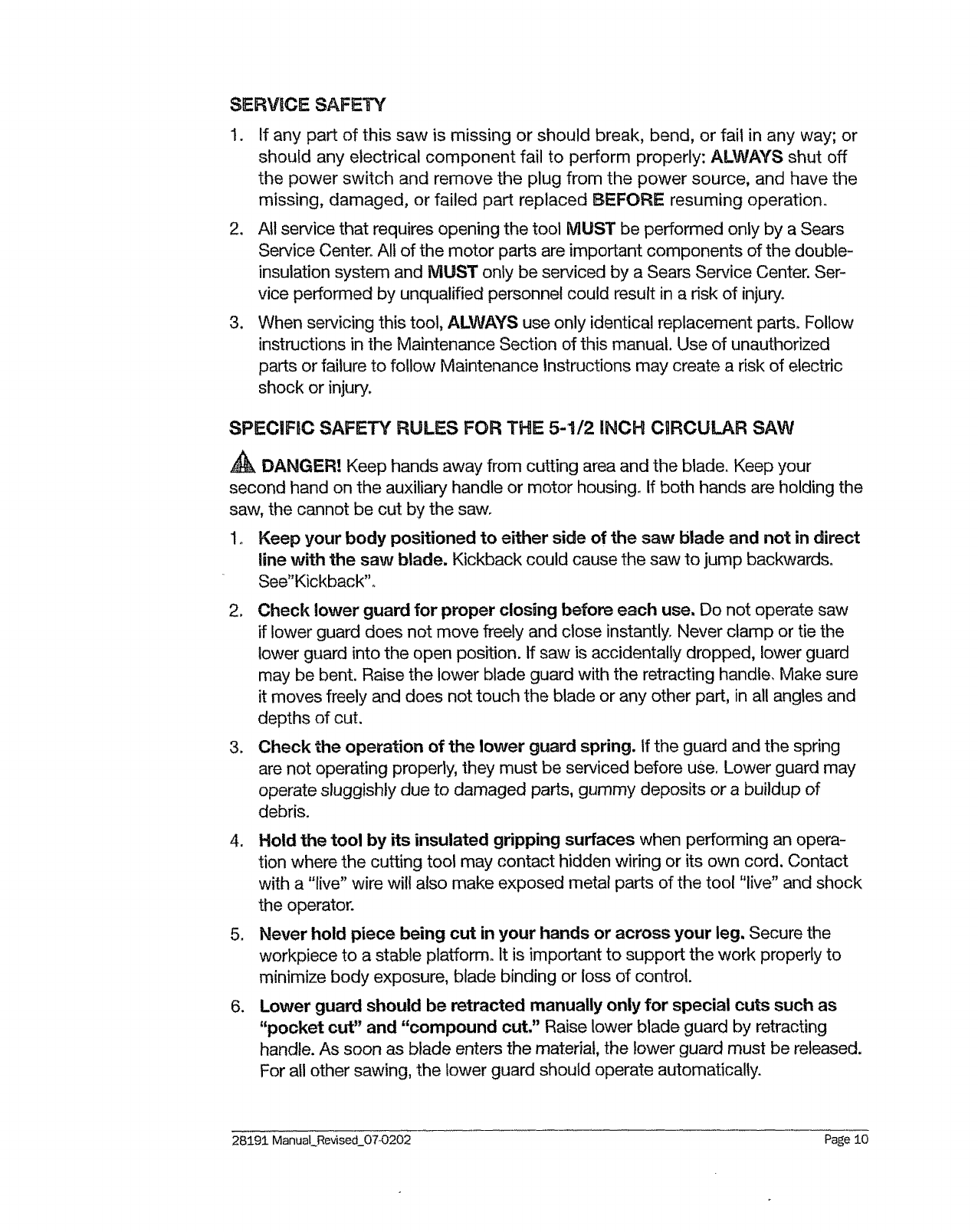
SERVICE SAFETY
#
2_
3_
If any part of this saw is missing or should break, bend, or fail in any way; or
should any electrical component fail to perform properly: ALWAYS shut off
the power switch and remove the plug from the power source, and have the
missing, damaged, or failed part replaced BEFORE resuming operation.
All ser,4ce that requires opening the tool MUST be performed only by a Sears
Service Center° All of the motor parts are important components of the double-
insulation system and MUST only be serviced by a Sears Service Center. Ser-
vice performed by unqualified personnel could result in a risk of injury°
When servicing this tool, ALWAYS use only identical replacement parts. Follow
instructions in the Maintenance Section of this manual. Use of unauthorized
parts or failure to follow Maintenance Instructions may create a risk of electric
shock or injury.
SPECiFiC SAFETY RULES FOR THE 5-1/2 iNCH CIRCULAR SAW
_k DANGER! Keep hands away from cutting area and the blade. Keep your
second hand on the auxiliary handle or motor housing. If both hands are holding the
saw, the cannot be cut by the saw.
1o Keep your body positioned to either side of the saw blade and not in direct
line with the saw blade. Kickback could cause the saw to jump baclqwards.
See'Kickback"o
2. Check lower guard for proper closing before each use, Do not operate saw
if lower guard does not move freely and close instantly, Never clamp or tie the
lower guard into the open position. If saw is accidentally dropped, lower guard
may be bent. Raise the lower blade guard with the retracting handle, Make sure
it moves freely and does not touch the blade or any other part, in all angles and
depths of cut.
3. Check the operation of the lower guard spring, tf the guard and the spring
are not operating properly, they must be serviced before use, Lower guard may
operate sluggishly due to damaged parts, gummy deposits or a buildup of
debris.
4. Hold the tool by its insulated gripping surfaces when performing an opera-
tion where the cutting tool may contact hidden wiring or its own cord. Contact
with a "live" wire will also make exposed metal parts of the tool "live" and shock
the operator.
5. Never hold piece being cut in your hands or across your leg, Secure the
workpiece to a stable platform. It is important to support the work properly to
minimize body exposure, blade binding or loss of control.
6. Lower guard should be retracted manually only for special cuts such as
"pocket cut" and "compound cut." Raise lower blade guard by retracting
handle. As soon as blade enters the material, the lower guard must be released.
For all other sawing, the lower guard should operate automatically.
28191 Manual_Re,,4sed_07_0202 Page 10
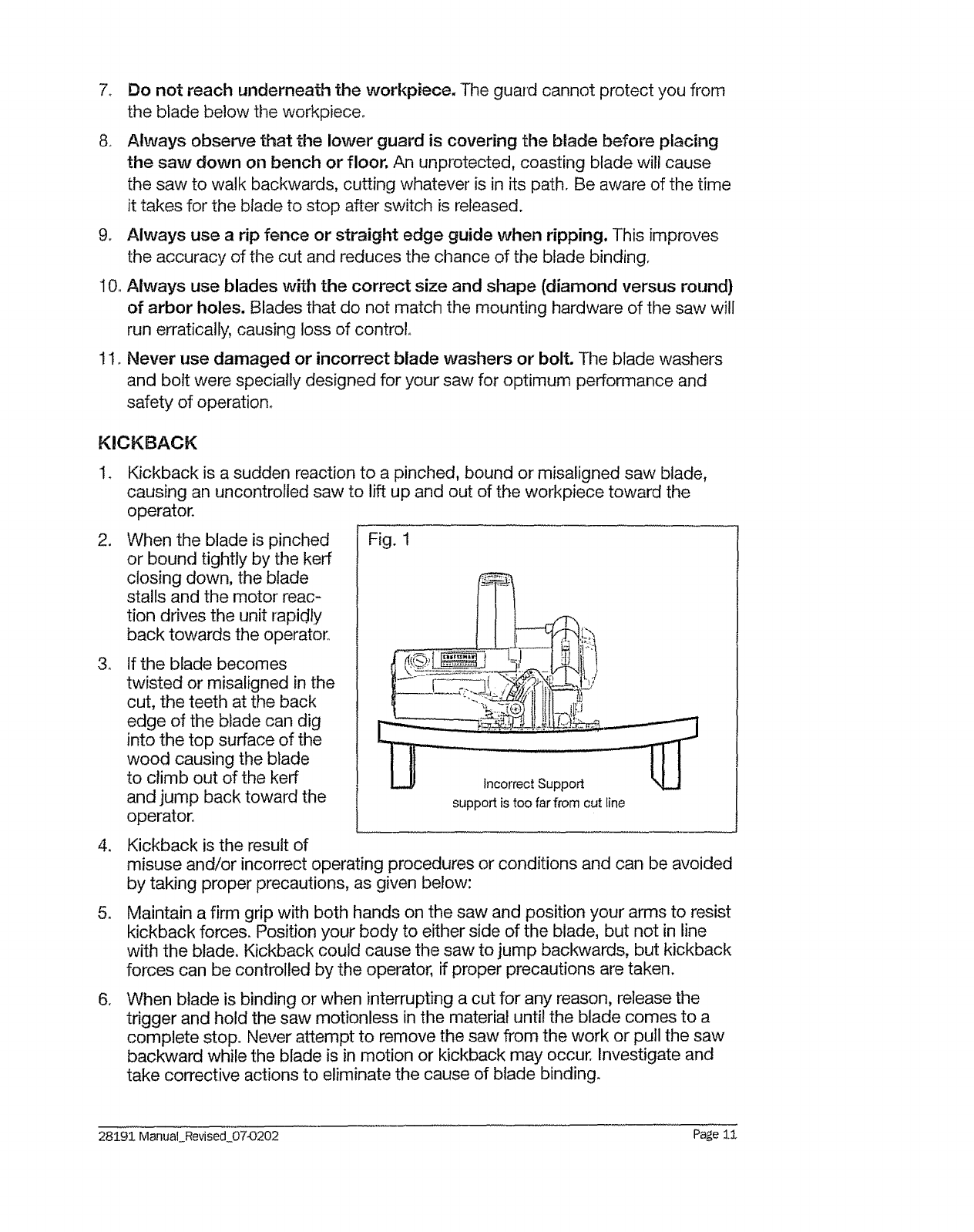
7o Do not reach underneath the workpiece. The guald cannot protect you from
the blade below the workpiece.
8_ Always observe that the lower guard is covering the blade before placing
the saw down on bench or floor. An unprotected, coasting blade will cause
the saw to walk backwards, cutting whatever is in its path. Be aware of the time
it takes for the blade to stop after switch is released.
9. Always use a rip fence or straight edge guide when ripping. This improves
the accuracy of the cut and reduces the chance of the blade binding,
I0 Always use blades with the correct size and shape (diamond versus round)
of arbor holes. Blades that do not match the mounting hardware of the saw will
run erratically, causing loss of control,
11, Never use damaged or incorrect blade washers or bolt. The blade washers
and bolt were specially designed for your saw for optimum performance and
safety of operation.
KICKBACK
14
24
3_
*
.
r
Kickback is a sudden reaction to a pinched, bound or misaligned saw blade,
causing an uncontrolled saw to lift up and out of the workpiece toward the
operator.
When the blade is pinched
or bound tightly by the kerf
closing down, the blade
stalls and the motor reac-
tion drives the unit rapidly
back towards the operator
If the blade becomes
twisted or misaligned in the
cut, the teeth at the back
edge of the blade can dig
into the top surface of the
wood causing the blade
to climb out of the ked
and jump back toward the
operator.
Fig. 1
Incorrect Support
support is too far from cut line
Kickback is the result of
misuse and/or incorrect operating procedures or conditions and can be avoided
by taking proper precautions, as given below:
Maintain a firm grip with both hands on the saw and position your arms to resist
kickback forces. Position your body to either side of the blade, but not in line
with the blade. Kickback could cause the saw to jump backwards, but kickback
forces can be controlled by the operator, if proper precautions are taken.
When blade is binding or when interrupting a cut for any reason, release the
trigger and hold the saw motionless in the material until the blade comes to a
complete stop. Never attempt to remove the saw from the work or pull the saw
backward while the blade is in motion or kickback may occur. Investigate and
take corrective actions to eliminate the cause of blade binding.
28191 Manual Revised 07©202 Page 11
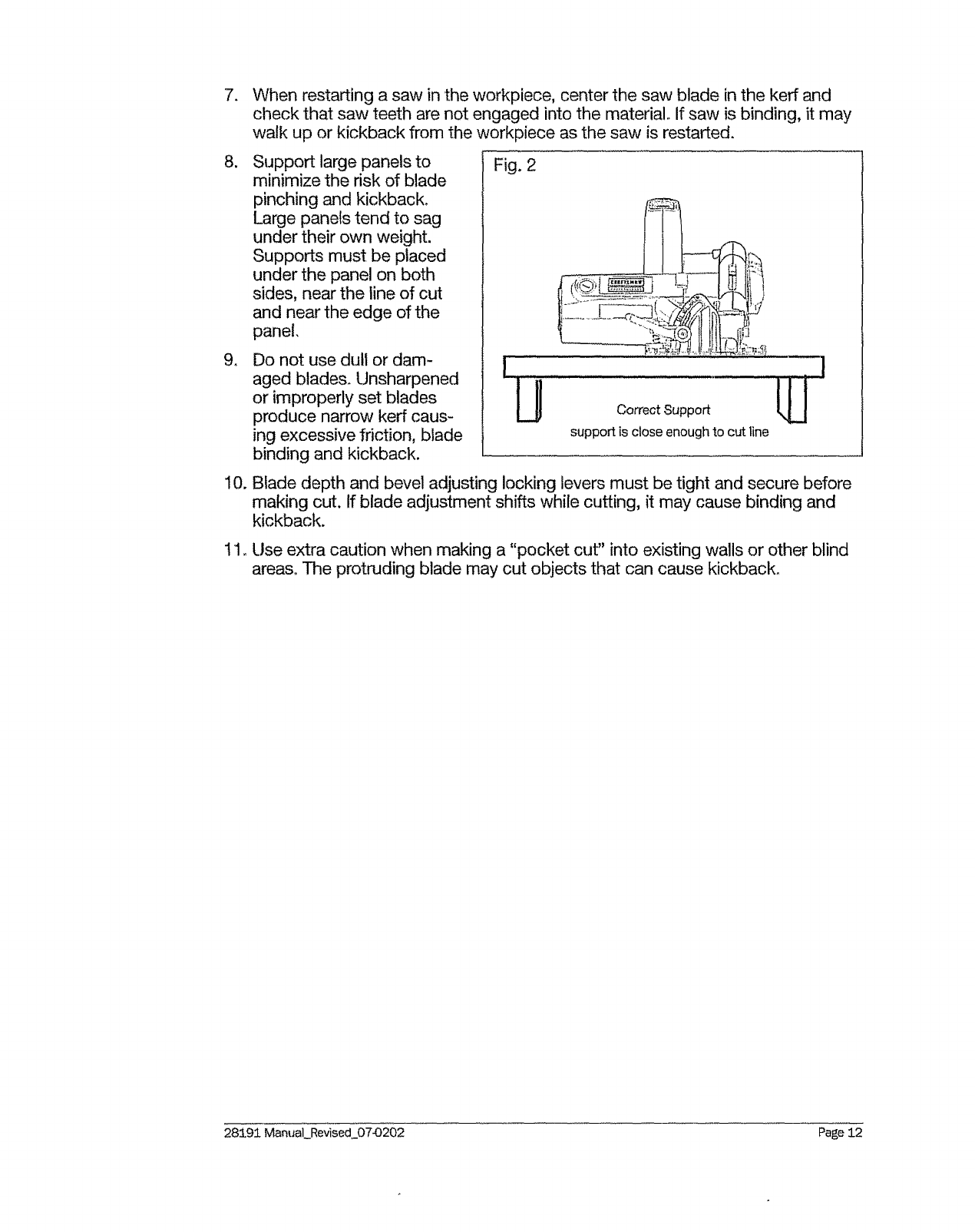
7_
.
g_
When restarting a saw in the workpiece, center the saw blade in the kerf and
check that saw teeth are not engaged into the material,. If saw is binding, it may
walk up or kickback from the workpiece as the saw is restarted.
Support large panels to
minimize the risk of blade
pinching and kickback,
Large panels tend to sag
under their own weight.
Supports must be placed
under the panel on both
sides, near the line of cut
and near the edge of the
panel.
Do not use dull or dam-
aged blades. Unsharpened
or improperly set blades
produce narrow kerf caus-
ing excessive friction, blade
binding and kickback.
Fig. 2
Correct Sup'port ..... _j I
support is close enough to cut line
10. Blade depth and bevel adjusting locking levers must be tight and secure before
making cut. if blade adjustment shifts while cutting, it may cause binding and
kickback.
11. Use extra caution when making a "pocket cut" into existing walls or other blind
areas° The protruding blade may cut objects that can cause kickback.
28191 Mammal Revised_07-0202 Page 12
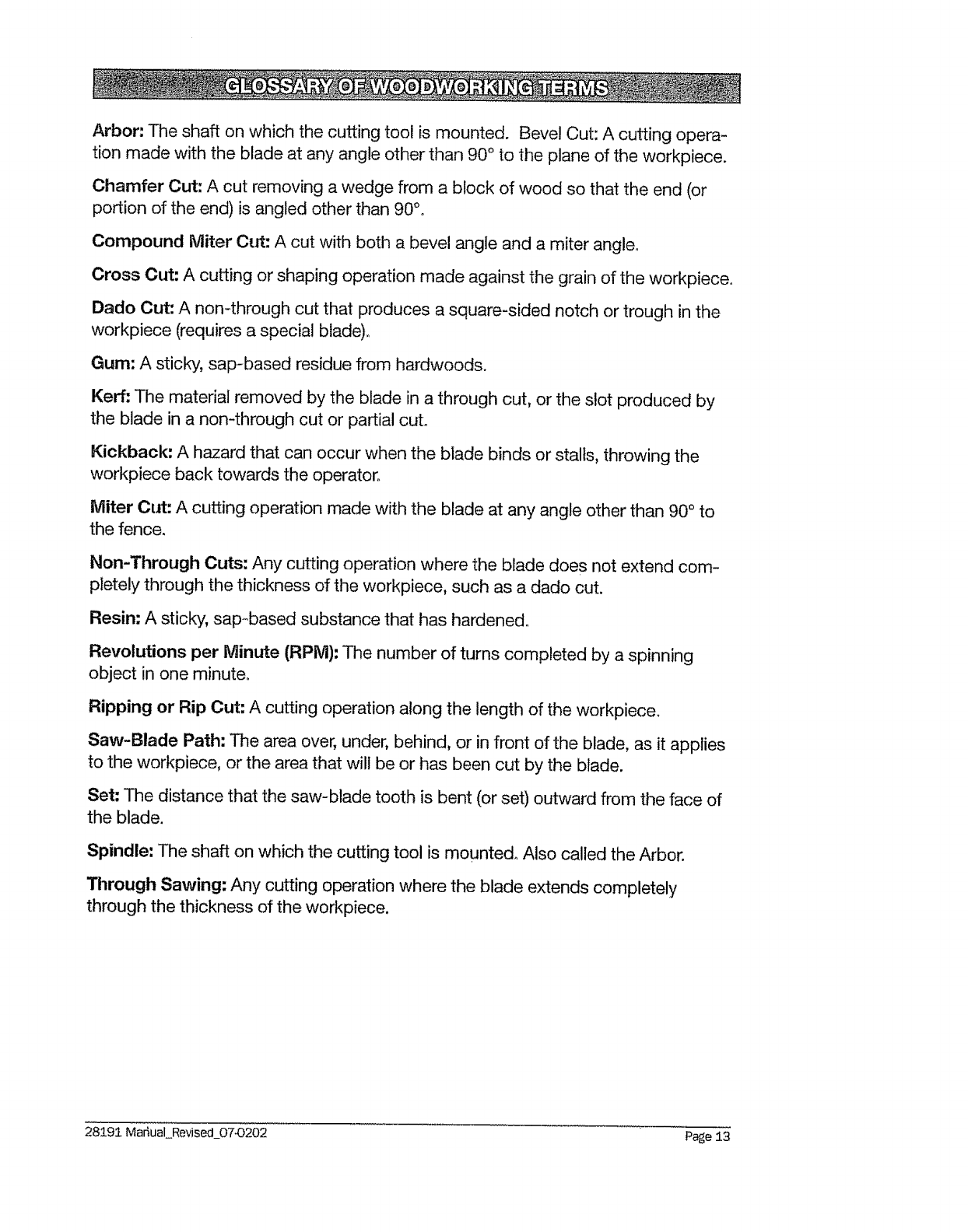
Arbor: The shaft on which the cutting tool is mounted. Bevel Cut: A cutting opera-
tion made with the blade at any angle other than 90 ° to the plane of the workpiece.
Chamfer Cut: A cut removing a wedge from a block of wood so that the end (or
portion of the end) is angled other than 90°°
Compound Miter CUt: A cut with both a bevel angle and a miter angle.
Cross Cut; A cutting or shaping operation made against the grain of the workpiece.
Dado Cut; A non-through cut that produces a square-sided notch or trough in the
workpiece (requires a special blade),,
Gum: A sticky, sap-based residue from hardwoods.
Kerr: The material removed by the blade in a through cut, or the slot produced by
the blade in a non-through cut or partial cut°
Kickback: A hazard that can occur when the blade binds or stalls, throwing the
workpiece back towards the operator°
Miter CUt: A cutting operation made with the blade at any angle other than 90 ° to
the fence.
Non-Through Cuts: Any cutting operation where the blade does not extend com-
pletely through the thickness of the workpiece, such as a dado cut.
Resin: A sticky, sap-based substance that has hardened.
Revolutions per Minute (RPM)" The number of turns completed by a spinning
object in one minute.
Ripping or Rip Cut; A cutting operation along the length of the workpiece.
Saw-Blade Path: The area over, under, behind, or in front of the blade, as it applies
to the workpiece, or the area that will be or has been cut by the blade.
Set: The distance that the saw-blade tooth is bent (or set) outward from the face of
the blade.
Spindle: The shaft on which the cutting tool is mounted. Also called the Arbor.
Through Sawing: Any cutting operation where the blade extends completely
through the thickness of the workpiece.
28191 Mar_uaLRevised_07©202 Page 13
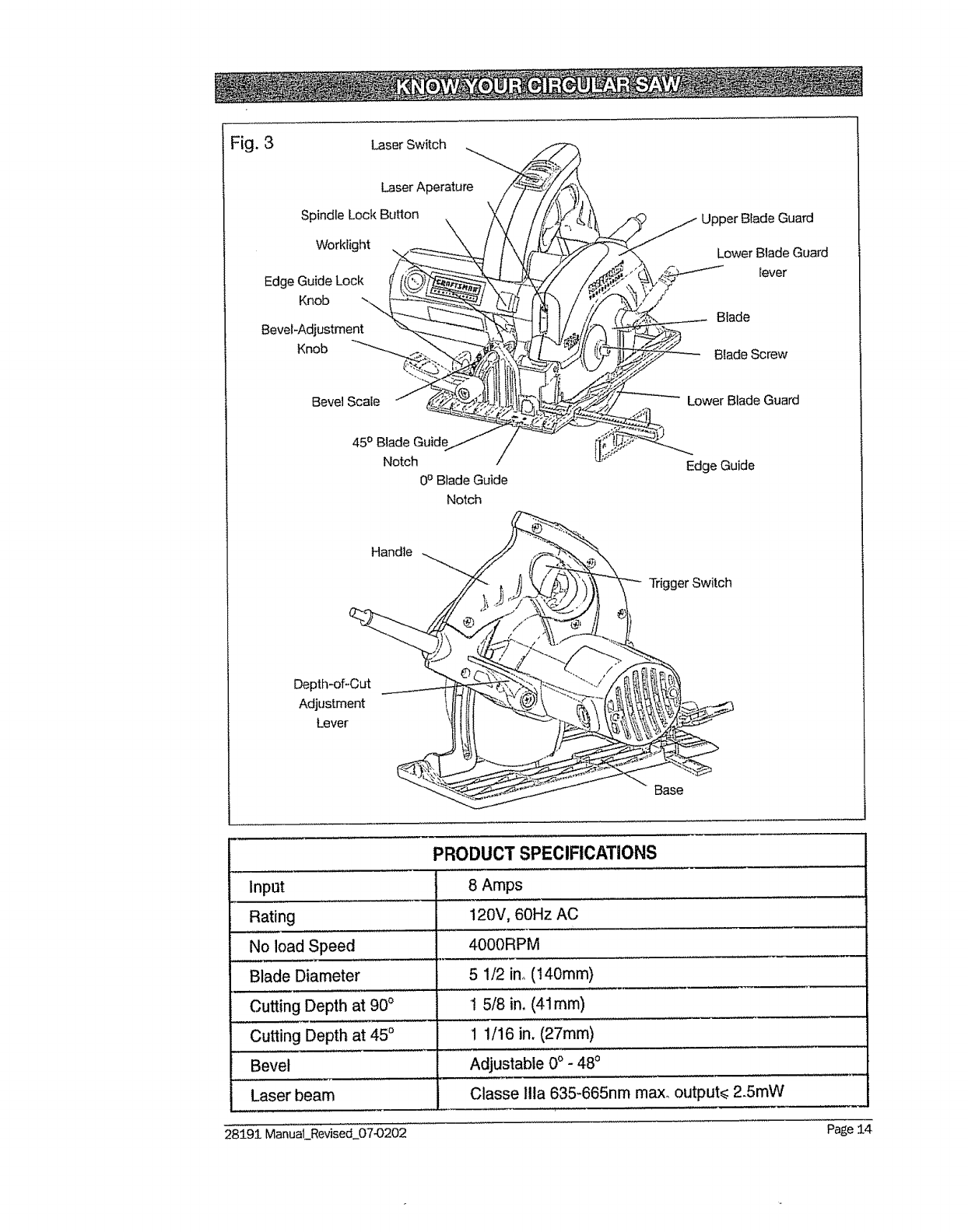
Fig. 3 Laser Switch
Spindle Lock Button
Worldight
Edge Guide Lock
Knob
Bevel-Adjustment
Knob
Bevel Scale
45 ° Blade Guide
Notch
0 ° Blade Guide
Notch
Upper Blade Guard
Lower Blade Guard
lever
Blade
Blade Screw
Lower Blade Guard
Edge Guide
Handle
Depth*of-Cut
Adjustment
Lever
Trigger Switch
Base
PRODUCT SPECIFICATIONS
Input 8 Amps
Rating 120V, 60Hz AC
No load Speed 4000RPM
Blade Diameter 5 1/2 in,, (140ram)
Cutting Depth at 90° t 5!8 in, (41 mm)
Cutting Depth at 45°1 1/16 in. (27mm)
Bevel Adjustable 0° - 480
Laser beam Classe Ilia 635-665nm max° outputs< 2.SmW
28191 ManuaLRevised_OTO202 Page 14
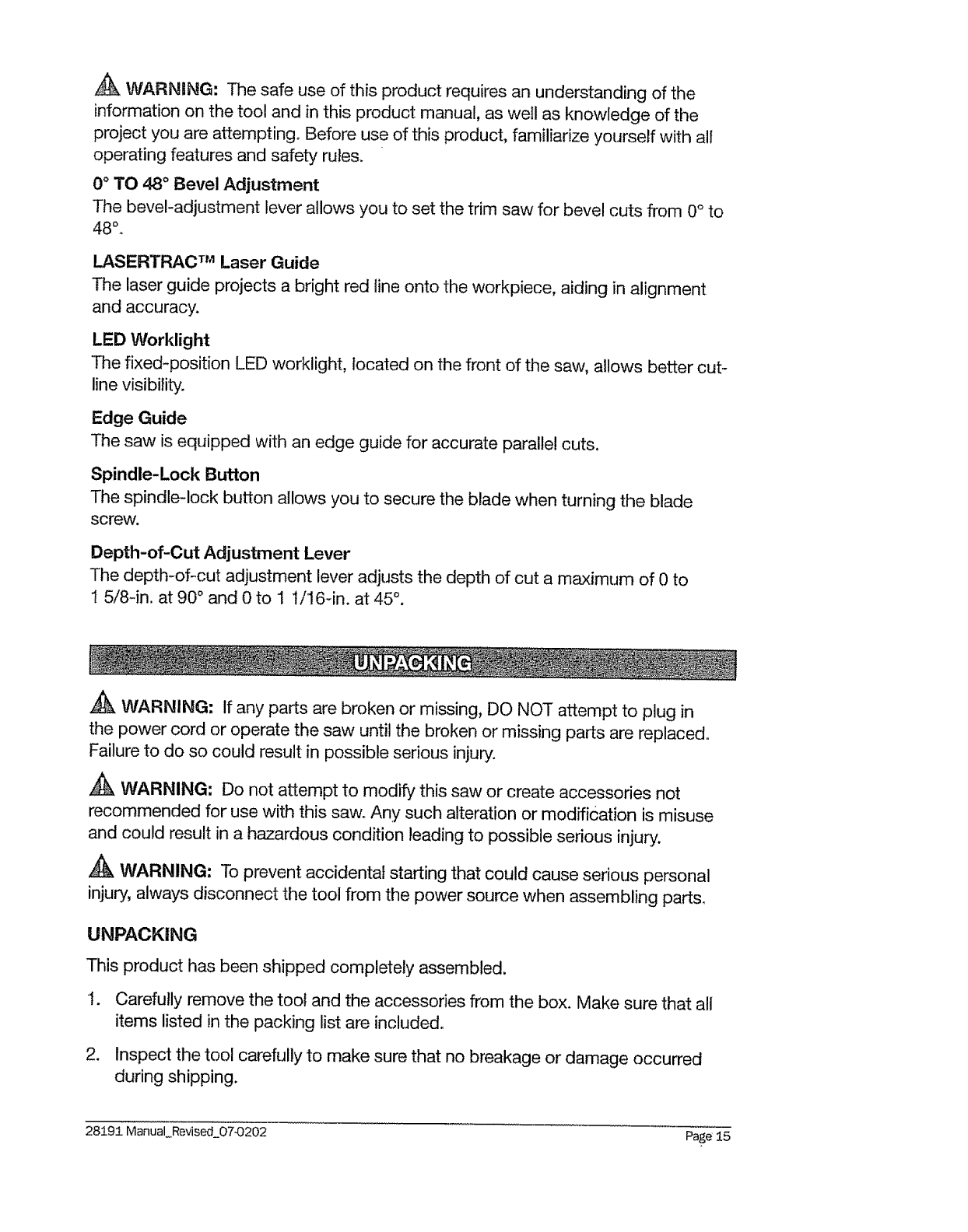
WARNING: The safe use of this product requires an understanding of the
information on the tool and in this product manual, as well as knowledge of the
project you are attempting° Before use of this product, familiarize yourself with all
operating features and safety rules.
0°TO 48 ° Bevel Adjustment
The bevel-adjustment lever allows you to set the trim saw for bevel cuts from 0° to
48°
LASERTRAC TM Laser Guide
The laser guide projects a bright red line onto the workpiece, aiding in alignment
and accuracy.
LED Worklight
The fixed-position LED worklight, located on the front of the saw, allows better cut-
line visibility.
Edge Guide
The saw is equipped with an edge guide for accurate parallel cuts.
Spindle-Lock Button
The spindle-lock button allows you to secure the blade when turning the blade
screw.
Depth-of-Cut Adjustment Lever
The depth-of-cut adjustment lever adjusts the depth of cut a maximum of 0 to
1 5i8qn. at 90 ° and 0 to 1 1/164n. at 45 °.
WARNING: If any parts are broken or missing, DO NOT attempt to plug in
the power cord or operate the saw until the broken or missing parts are replaced.
Failure to do so could result in possible serious injury.
Z_ WARNING: Do not attempt to modify this saw or create accessories not
recommended for use with this saw° Any such alteration or modification is misuse
and could result in ahazardous condition leading to possible serious injury.
WARNING: To prevent accidental starting that could cause serious personal
injury, always disconnect the tool from the power source when assembling parts.
UNPACKING
This product has been shipped completely assembled.
1. Carefully remove the too! and the accessories from the box. Make sure that all
items listed in the packing list are included.
2. Inspect the tool carefully to make sure that no breakage or damage occurred
during shipping.
28191 ManuaLRevised_07©202 Page 15
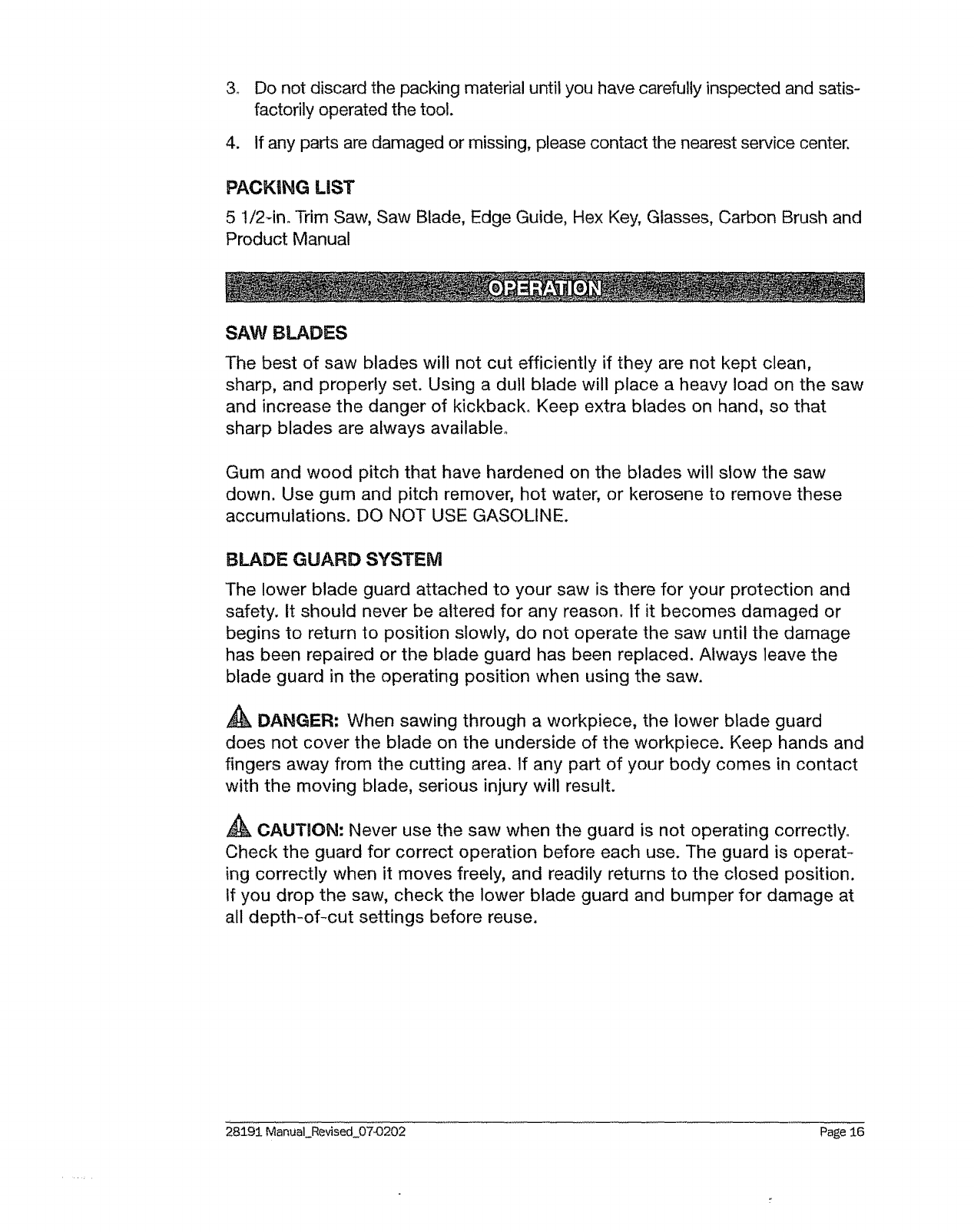
3_ Do not discard the packing material until you have carefully inspected and satis-
factorily operated the too!.
4. if any parts are damaged or missing, please contact the nearest service center.
PACKING LiST
5 1/24n_ Trim Saw, Saw Blade, Edge Guide, Hex Key, Glasses, Carbon Brush and
Product Manual
SAW BLADES
The best of saw blades will not cut efficiently if they are not kept clean,
sharp, and properly set. Using a dull blade will place a heavy load on the saw
and increase the danger of kickback. Keep extra blades on hand, so that
sharp blades are always available°
Gum and wood pitch that have hardened on the blades will slow the saw
down. Use gum and pitch remover, hot water, or kerosene to remove these
accumulations. DO NOT USE GASOLINE.
BLADE GUARD SYSTEM
The lower blade guard attached to your saw is there for your protection and
safety, it should never be altered for any reason. If it becomes damaged or
begins to return to position slowly, do not operate the saw until the damage
has been repaired or the blade guard has been replaced. Always leave the
blade guard in the operating position when using the saw.
,_ DANGER: When sawing through a workpiece, the lower blade guard
does not cover the blade on the underside of the workpiece. Keep hands and
fingers away from the cutting area. If any part of your body comes in contact
with the moving blade, serious injury will result.
CAUTnON: Never use the saw when the guard is not operating correctly.
Check the guard for correct operation before each use. The guard is operat-
ing correctly when it moves freely, and readily returns to the closed position.
If you drop the saw, check the lower blade guard and bumper for damage at
all depth-of-cut settings before reuse.
28191 Manual Revised_0743202 Page 16

STARTING/STOPPIING THE
SAW (Fig. 4)
To start the saw: Depress the
trigger switch. Always allow
the blade to reach full speed,
then guide the saw into the
workpiece.
To stop the saw: Release
the trigger switch. After you
release the trigger switch,
allow the blade to come to
a complete stop_ Do not
remove the saw from the
workpiece while the blade is
moving,
Fig° 4
Trigger Switch
DEPTH-OF-CUT ADJUST-
NIENT (Fig. 5)
Always keep the correct depth-
of-cut setting. The correct
depth-of-cut setting should
not exceed 1/4 inch below the
material to be cut. Only one
saw-blade tooth should show
beneath the material. If more
than one blade tooth shows,
then the depth of cut is too
deep. Excessive depth of cut
will increase the chance of
kickback and cause the cut to
be rough.
Fig. 5
Depth Scale
Depth Indicator
Depth-of_Cut
Adjustment
Lever
TO ADJUST DEPTH OF CUT
o Disconnect the saw from the power source.
,, Loosen the depth-of-cut adjustment lever°
o Place the base flat on the workpiece, and raise or lower the saw until the depth-
of-cut indicator aligns with the desired depth on the scale.
o Securely tighten the depth-of-cut adjustment lever_
NOTE: Make a trial cut on a piece of scrap material to ensure that the laser is
aligned properly.
28191 Manual Revised_07-0202 Page 17
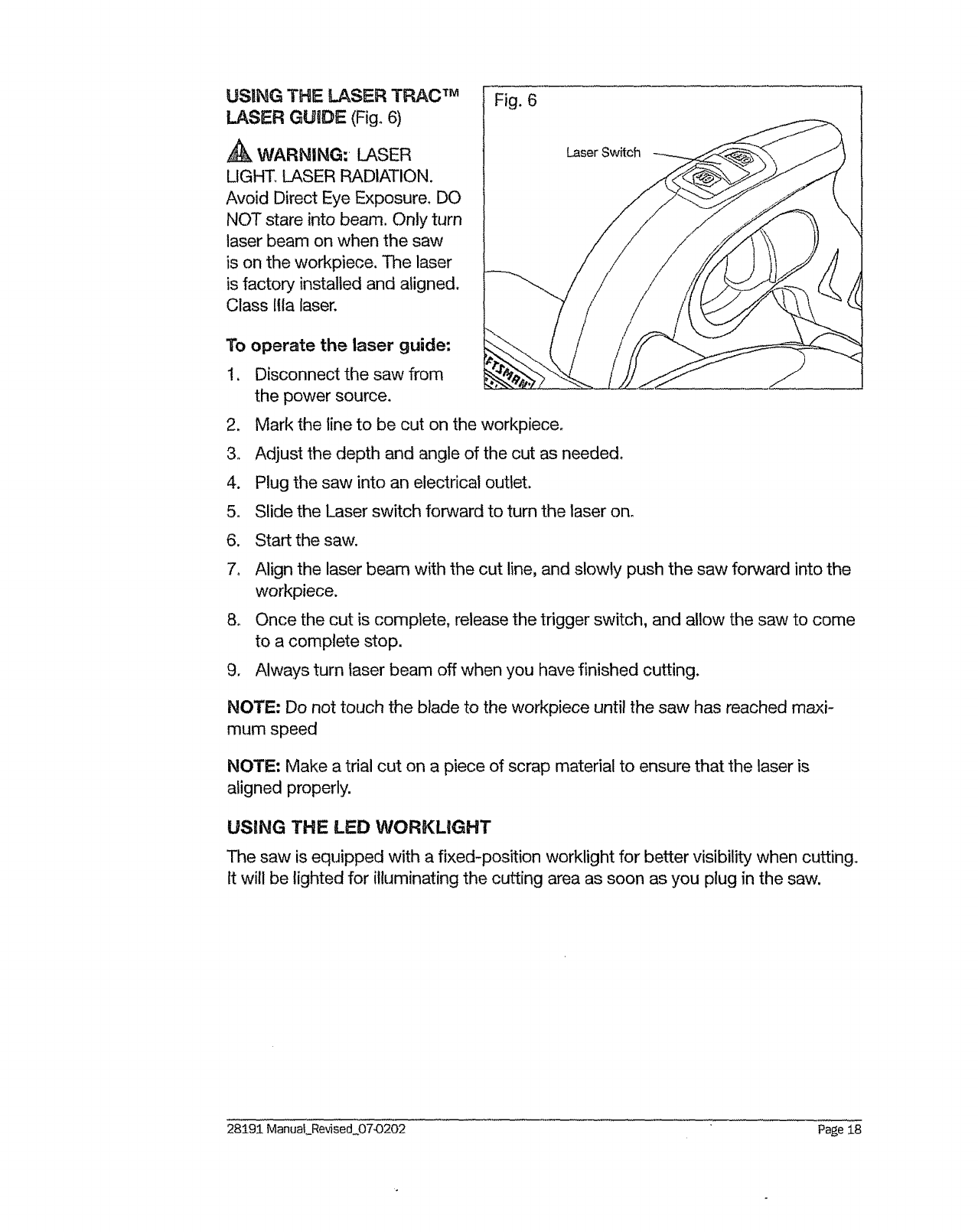
USUNG THE LASER TRAC TM
LASER GUIDE (Fig. 6)
,_ WARNING: !_ASER
LIGHT, LASER RADIATION.
Avoid Direct Eye Exposure, DO
NOT stare into beam. Only turn
laser beam on when the saw
is on the workpiece, The laser
is factory installed and aligned,
Class !lla laser.
To operate the laser guide:
1.
I Fig. 6
Laser Switch
Disconnect the saw from
the power source.
2. Mark the line to be cut on the workpiece_
3o Adjust the depth and angle of the cut as needed.
4. Plug the saw into an electrical outlet.
5. Slide the Laser switch forward to turn the laser on.
6. Start the saw.
7, Align the laser beam with the cut line, and slowly push the saw forward into the
workpiece.
& Once the cut is complete, release the trigger switch, and allow the saw to come
to a complete stop.
9. Always turn laser beam off when you have finished cutting.
NOTE: Do not touch the blade to the workpiece until the saw has reached maxi-
mum speed
NOTE: Make a trial cut on a piece of scrap material to ensure that the laser is
aligned properly.
USING THE LED WORKLeGHT
The saw is equipped with a fixed-position worklight for better visibility when cutting_
It will be lighted for illuminating the cutting area as soon as you plug in the saw.
28191 ManuaLRevised 07-0202 Page 18

OPERATING THE SAW
tt is important to understand the correct method for operating the sawnRefer to the
instructions in this section to learn the correct and incorrect ways for handling the
saw.
,_k DANGER: When lifting the saw from the workpiece, the blade is exposed on
the underside of the saw until the lower blade guard closes_ Make sure the lower
blade guard is closed before setting the saw down.
,_k DANGER: To make sawing easier and safer, always maintain proper control of
the saw.. Loss of control could cause an accident resulting in possible serious injury.
To make the best possible cut:
• Hold the saw firmly with
hand.
O "
o
Avoid placing your hand on
the workpiece while making
a cut.
Support the workpiece so
that the cut (kerr) is always
to your side.
Support the workpiece near
the cut°
Clamp the workpiece
securely, so that the work-
piece will not move during
the cut.
Always place the saw on
the workpiece that is sup-
ported, not the "cut off"
piece.
Place the workpiece with
the "good" side down.
Draw a guideline along the
desired line of cut before
beginning your cut.
NOTE: The "good" side of the
workpiece is the side where
appearance is important.
Fig. 7
Fig. 8
Wrong
WARNING: If the blade comes in contact with the workpiece before it reaches
full speed, it could cause the saw to "kickback" towards you, which could result in
serious injury.
28191 Manual_Revised O7-0202 Page 19
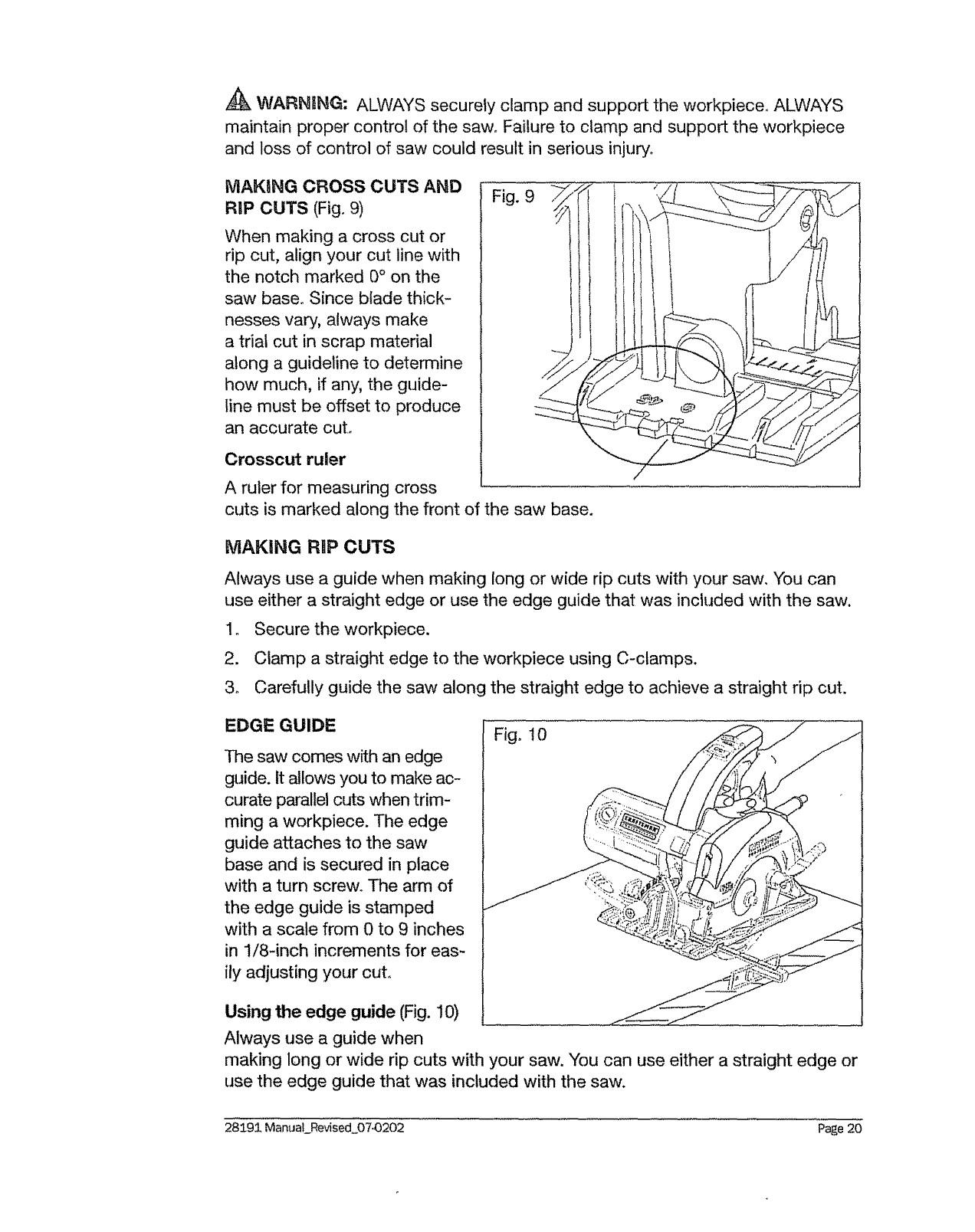
,_ WARNING: ALWAYS securely clamp and support the workpiece. ALWAYS
maintain proper control of the saw. Failure to clamp and support the workpiece
and loss of control of saw could result in serious injury°
MAKING CROSS CUTS AND
RIP CUTS (Fig. 9)
When making a cross cut or
rip cut, align your cut line with
the notch marked 0°on the
saw base° Since blade thick-
nesses va_, always make
a trial cut in scrap material
along a guideline to determine
how much, if any, the guide-
line must be offset to produce
an accurate cuL
Fig. 9
Crosscut ruler
A ruler for measuring cross
cuts is marked along the front of the saw base.
MAKllNG RiP CUTS
Always use a guide when making long or wide rip cuts with your saw, You can
use either a straight edge or use the edge guide that was included with the saw,
1. Securethe workpiece.
2. Clamp a straight edge to the workpiece using C-clamps.
3. Carefully guide the saw along the straight edge to achieve a straight rip cut,
EDGE GUIDE
The saw comes with an edge
guide. It allows you to make ac-
curate parallel cuts when trim-
ming a workpiece. The edge
guide attaches to the saw
base and is secured in place
with a turn screw. The arm of
the edge guide is stamped
with a scale from 0 to 9 inches
in 1/8-inch increments for eas-
ily adjusting your cut.
Fig_ 10
Using the edge guide (Fig. 10)
Always use a guide when
making long or wide rip cuts with your saw. You can use either a straight edge or
use the edge guide that was included with the saw.
28191 Manuat Revised_07-0202 Page 20
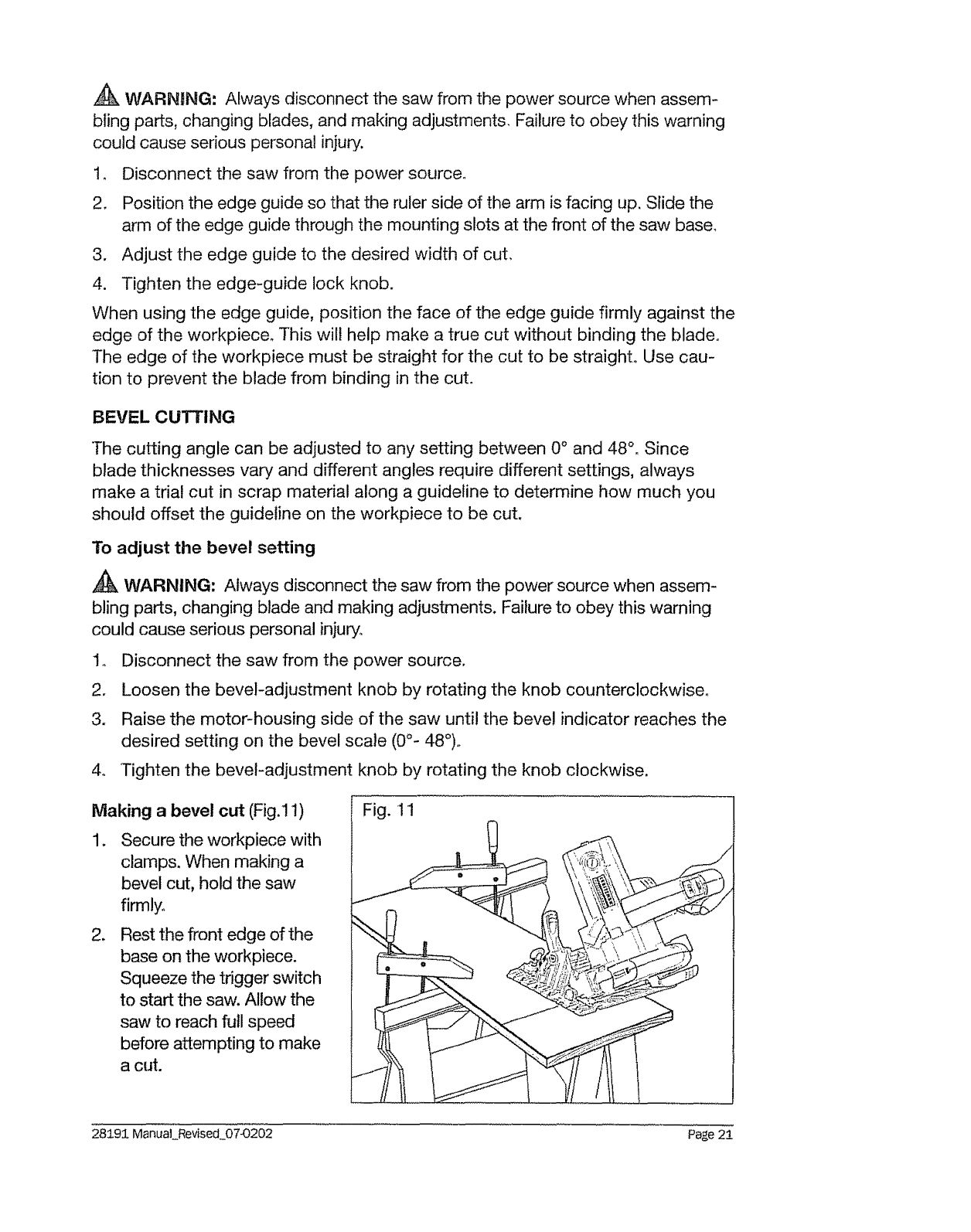
WARNING: Always disconnect the saw from the power source when assem-
bling parts, changing blades, and making adjustments, Failure to obey this warning
could cause serious personal injury.
1. Disconnect the saw from the power source.
2, Position the edge guide so that the ruler side of the arm is facing up. Slide the
arm of the edge guide through the mounting slots at the front of the saw base,
3. Adjust the edge guide to the desired width of cut,
4. Tighten the edge-guide lock knob.
When using the edge guide, position the face of the edge guide firmly against the
edge of the workpiece. This wilt help make a true cut without binding the blade.
The edge of the workpiece must be straight for the cut to be straighL Use cau-
tion to prevent the blade from binding in the cut°
BEVEL CUTTING
The cutting angle can be adjusted to any setting between 0 ° and 48°_ Since
blade thicknesses vary and different angles require different settings, always
make a trial cut in scrap material along a guideline to determine how much you
should offset the guideline on the workpiece to be cut,
To adjust the bevel setting
_k WARNING: Always disconnect the saw from the power source when assem-
bling parts, changing blade and making adjustments. Failure to obey this warning
could cause serious personal injury°
1. Disconnect the saw from the power source.
2. Loosen the bevel-adjustment knob by rotating the knob counterclockwise.
3. Raise the motor-housing side of the saw until the bevel indicator reaches the
desired setting on the bevel scale (0 °- 48°)°
4. Tighten the bevel-adjustment knob by rotating the knob clockwise.
Making a bevel cut (Fig.11)
.Secure the workpiece with
clamps. When making a
bevel cut, hold the saw
firmly.,
2_ Rest the front edge of the
base on the workpiece.
Squeeze the trigger switch
to start the saw, Allow the
saw to reach full speed
before attempting to make
a cut.
Fig. 11
28191 ManuaLRevised_07-0202 Page 21
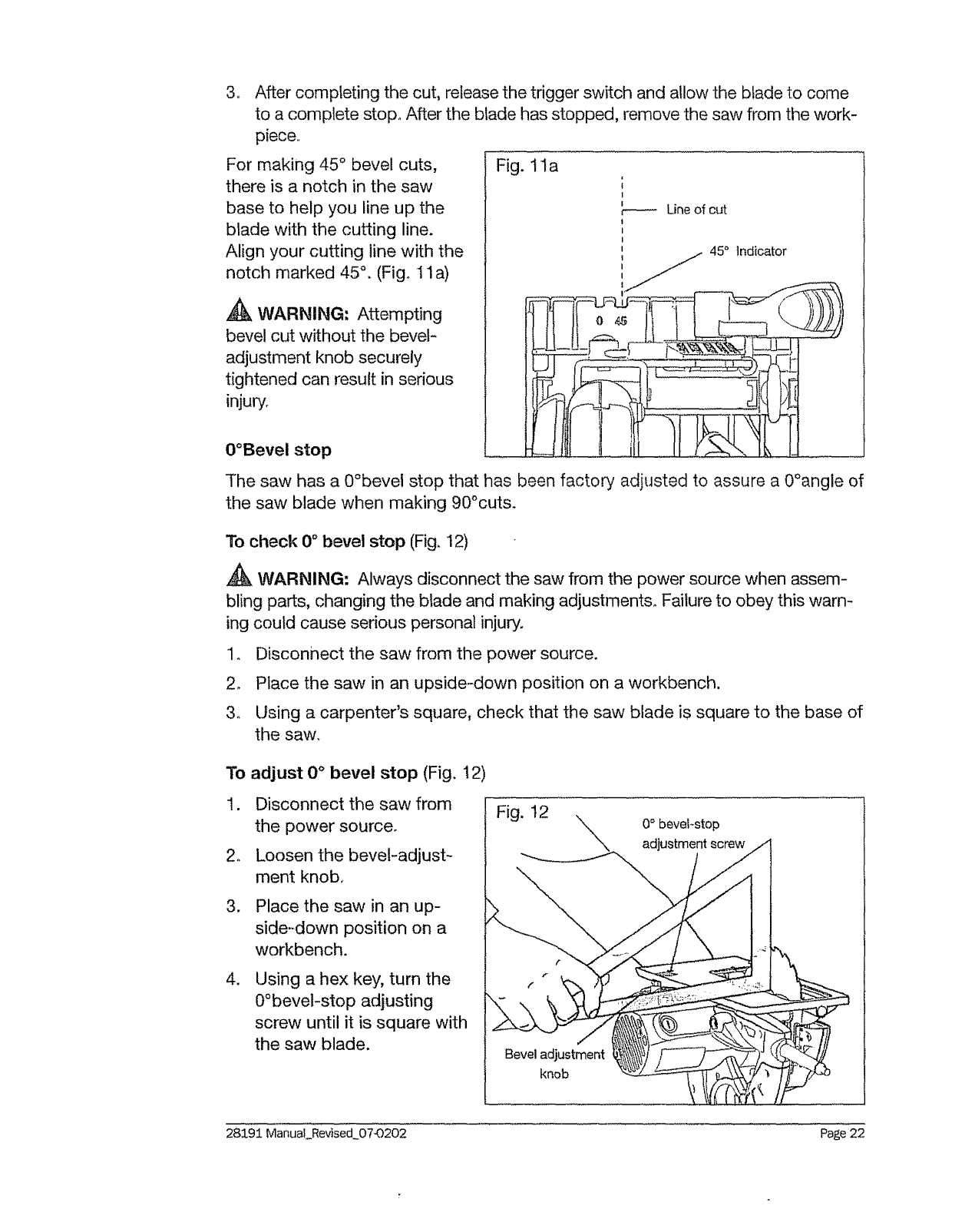
3_ After completing the cut, release the trigger switch and allow the blade to come
to a complete stop. After the blade has stopped, remove the saw from the work-
piece,,
For making 45 ° bevel cuts,
there is a notch in the saw
base to help you line up the
blade with the cutting line.
Align your cutting line with the
notch marked 45 °. (Fig° 11 a)
,_ WARNING; Attempting
bevel cut without the beveL-
adjustment knob securely
tightened can result in serious
injury.
O°Bevei stop
Fig. 1la
Une of cut
t_j. - 45° indicator
The saw has a 0°bevel stop that has been factory adjusted to assure a 0°angle of
the saw blade when making 90°cuts.
To check 0 ° bevel stop (Fig. 12)
_k WARNING; Always disconnect the saw from the power source when assem-
bling parts, changing the blade and making adjustments° Failure to obey this warn-
ing could cause serious personal injury.
I. Disconnect the saw from the power source.
2o Place the saw in an upside-down position on a workbench.
3. Using a carpenter's square, check that the saw blade is square to the base of
the saw,
To adjust 0 ° bevel stop (Fig, 12)
1. Disconnect the saw from
the power source.
2. Loosen the bevel-adjust-
ment knob.
3. Place the saw in an up-
side-down position on a
workbench.
4_ Using a hex key, turn the
0°bevel-stop adjusting
screw until it is square with
the saw blade.
Fig. t2
"_ 0° bevel_stop
adjustment screw
Bevel adjustment
knob
28191 ManuaLRevised 07-0202 Page 22
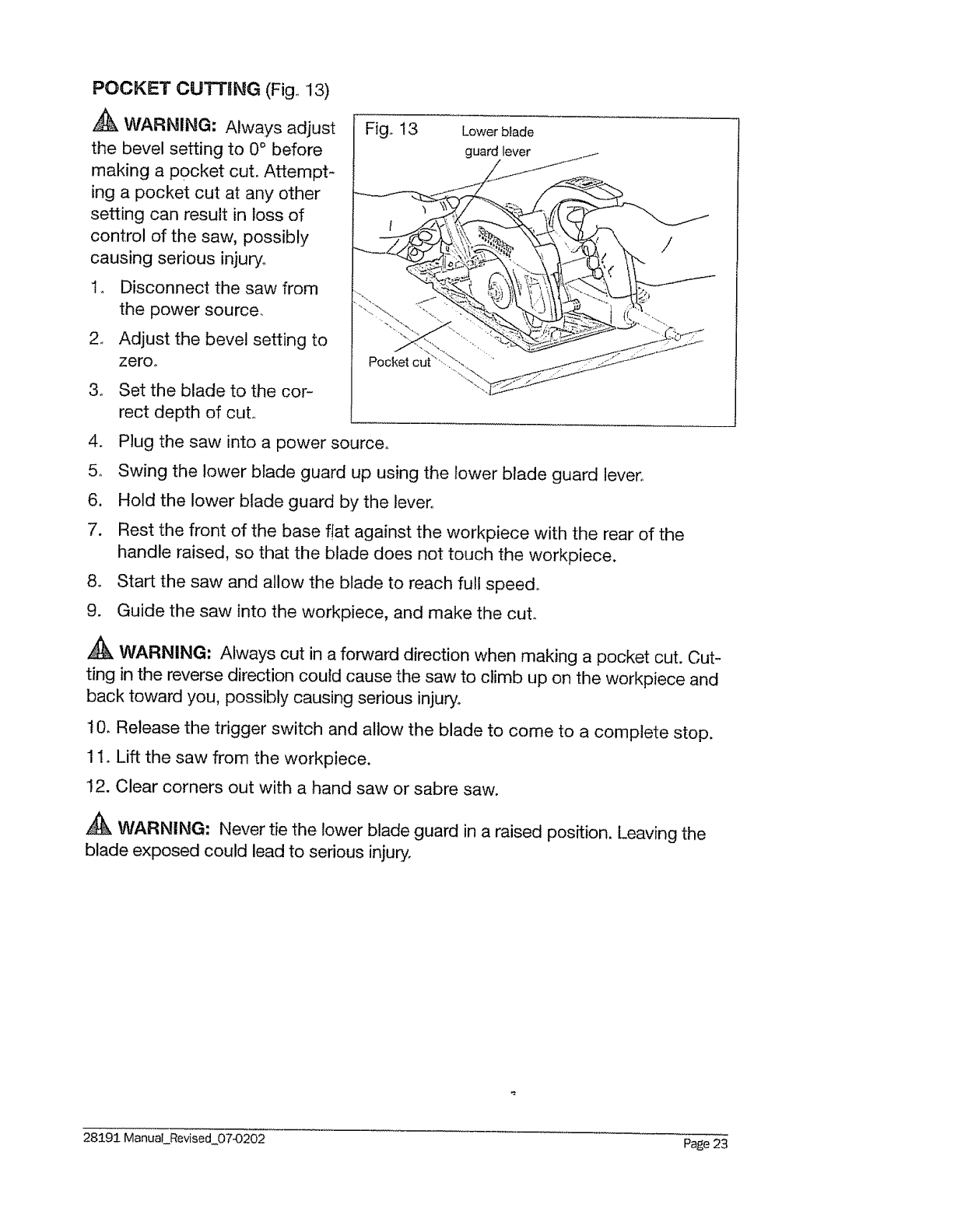
POCKET CUTTING (Fig, 13)
z_ WARNING; Always adjust
the bevel setting to 0 ° before
making a pocket cut. Attempt-
ing a pocket cut at any other
setting can result in loss of
control of the saw, possibly
causing serious injury°
1, Disconnect the saw from
the power source.
2, Adjust the bevel setting to
zero°
Fig° t 3 Lower blade
guard lever
3_ Set the blade to the cor-
rect depth of cut,,
/
4. Plug the saw into a power source.
5. Swing the lower blade guard up using the lower blade guard lever°
6. Hold the lower blade guard by the lever°
7. Rest the front of the base flat against the workpiece with the rear of the
handle raised, so that the blade does not touch the workpiece.
8. Start the saw and allow the blade to reach full speed°
9. Guide the saw into the workpiece, and make the cut.
,_ WARNING: Always cut in a forward direction when making a pocket cut. Cut-
ting in the reverse direction could cause the saw to climb up on the workpiece and
back toward you, possibly causing serious injury.
t 0o Release the trigger switch and allow the blade to come to a complete stop,
11. Lift the saw from the workpiece.
!2. Clear corners out with a hand saw or sabre saw.
WARNING; Never tie the lower blade guard in a raised position. Leaving the
blade exposed could lead to serious injury.
28191 ManuaLRevised 07-O202 Page 23
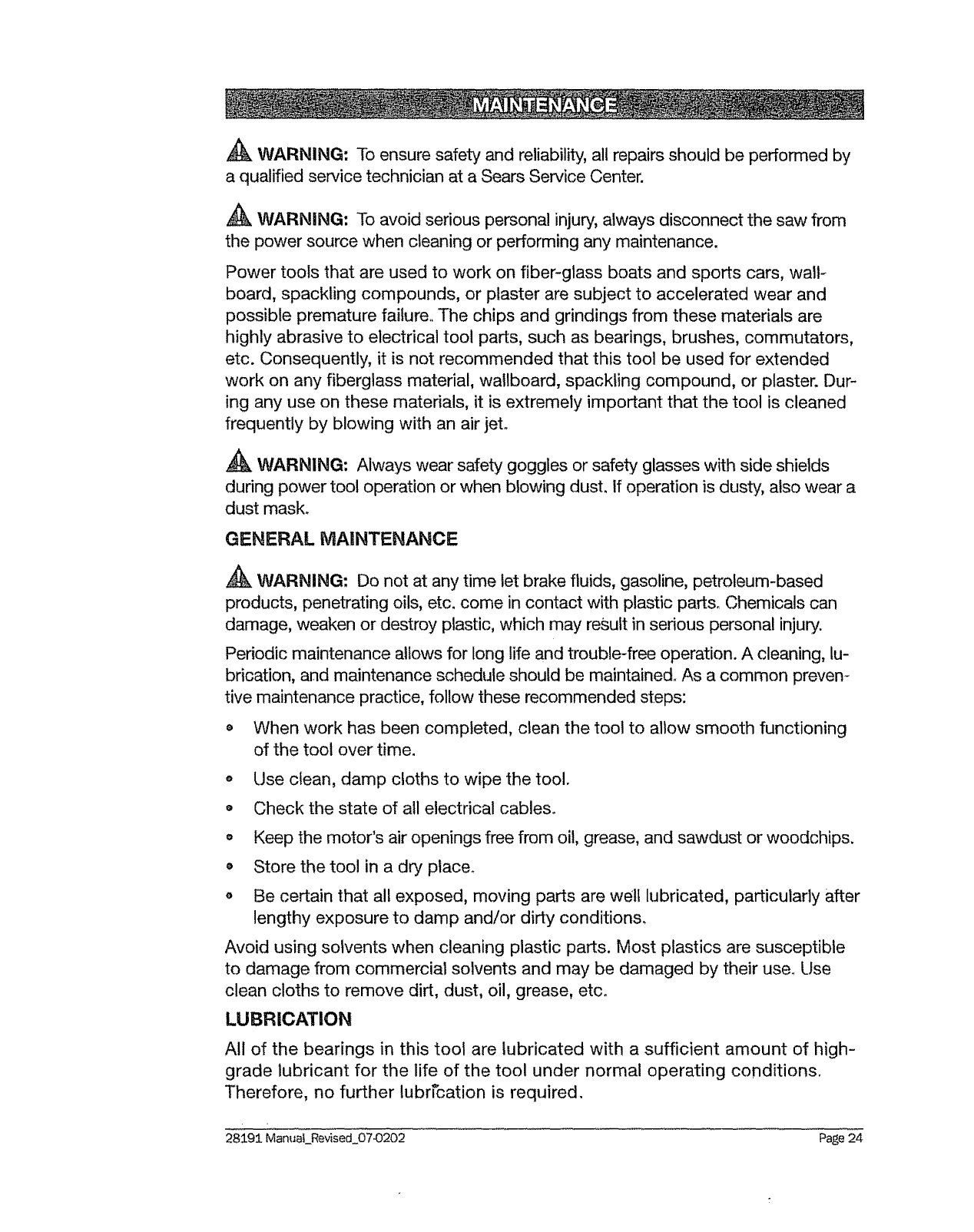
,_k WARNING: To ensure safety and reliability, all repairs should be performed by
a qualified service technician at a Sears Service Center.
_k WARNING: To avoid serious personal injury, always disconnect the saw from
the power source when cleaning or performing any maintenance.
Power tools that are used to work on fiber-glass boats and sports cars, walt-
board, spackling compounds, or plaster are subject to accelerated wear and
possible premature failure. The chips and grindings from these materials are
highly abrasive to electrical tool parts, such as bearings, brushes, commutators,
etc. Consequently, it is not recommended that this tool be used for extended
work on any fiberglass material, wallboard, spackling compound, or plaster. Dur-
ing any use on these materials, it is extremely important that the tool is cleaned
frequently by blowing with an air jet.
WARNING: Always wear safety goggles or safety glasses with side shields
during power tool operation or when blowing dust, If operation is dusty, also wear a
dust mask°
GENERAL MAINTENANCE
WARNING: Do not at any time let brake fluids, gasoline, petroleum-based
products, penetrating oils, etc. come in contact with plastic parts. Chemicals can
damage, weaken or destroy plastic, which may result in serious personal injury.
Periodic maintenance allows for long life and trouble-free operation. A cleaning, lu-
brication, and maintenance schedule should be maintained. As a common preven-
tive maintenance practice, follow these recommended steps:
G
9
O
O
O
When work has been completed, clean the tool to allow smooth functioning
of the tool over time.
Use clean, damp cloths to wipe the tool.
Check the state of all electrical cables°
Keep the motor's air openings free from oil, grease, and sawdust or woodchips.
Store the tool in a dry placer
Be certain that al! exposed, moving parts are welt lubricated, particularly after
lengthy exposure to damp and/or dirty conditions.
Avoid using solvents when cleaning plastic parts. Most plastics are susceptible
to damage from commercial solvents and may be damaged by their use. Use
clean cloths to remove dirt, dust, oil, grease, etco
LUBRICATION
All of the bearings in this tool are lubricated with a sufficient amount of high-
grade lubricant for the life of the tool under normal operating conditions.
Therefore, no further lubrTcation is required.
28191 ManuaLRevised_07©202 Page 24
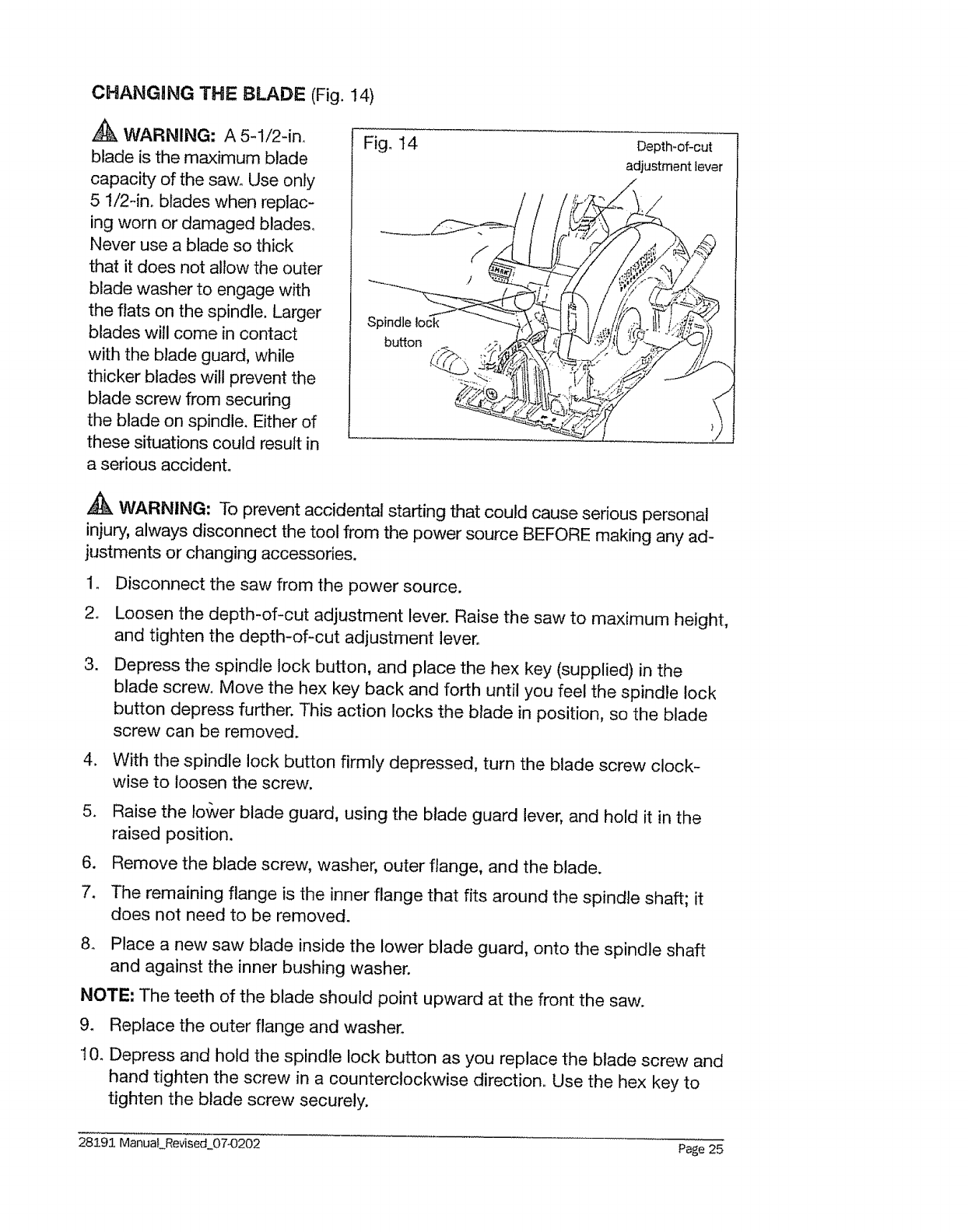
CHANGING THE BLADE (Fig. 14)
AWARNING: A 5-1/2-in°
blade is the maximum blade
capacity of the sawn Use only
5 1/2-in° blades when replac-
ing worn or damaged blades.
Never use a blade so thick
that it does not allow the outer
blade washer to engage with
the flats on the spindle. Larger
blades will come in contact
with the blade guard, while
thicker blades will prevent the
blade screw from securing
the blade on spindle. Either of
these situations could result in
a serious accident.
Fig, 14 Depth-of-cut
adjustment lever
Spindle
button
/
,_ WARNING: To prevent accidental starting that could cause serious personal
injury, always disconnect the tool from the power source BEFORE making any ad-
justments or changing accessories,
.
2,
.
Disconnect the saw from the power source.
Loosen the depth-of-cut adjustment lever. Raise the saw to maximum height,
and tighten the depth-of-cut adjustment lever°
Depress the spindle lock button, and place the hex key (supplied) in the
blade screw. Move the hex key back and forth until you feel the spindle lock
button depress further. This action locks the blade in position, so the blade
screw can be removed.
4. With the spindle lock button firmly depressed, turn the blade screw clock-
wise to loosen the screw.
5. Raise the Io,_Jer blade guard, using the blade guard lever, and hold it in the
raised position.
6. Remove the blade screw, washer, outer flange, and the blade.
The remaining flange is the inner flange that fits around the spindle shaft; it
does not need to be removed.
8.. Place a new saw blade inside the lower blade guard, onto the spindle shaft
and against the inner bushing washer.
NOTE_ The teeth of the blade should point upward at the front the saw.
9. Replace the outer flange and washer_
10o Depress and hold the spindle lock button as you replace the blade screw and
hand tighten the screw in a counterclockwise direction° Use the hex key to
tighten the blade screw securely.
28191 Manual Revised 0743202 Page 25
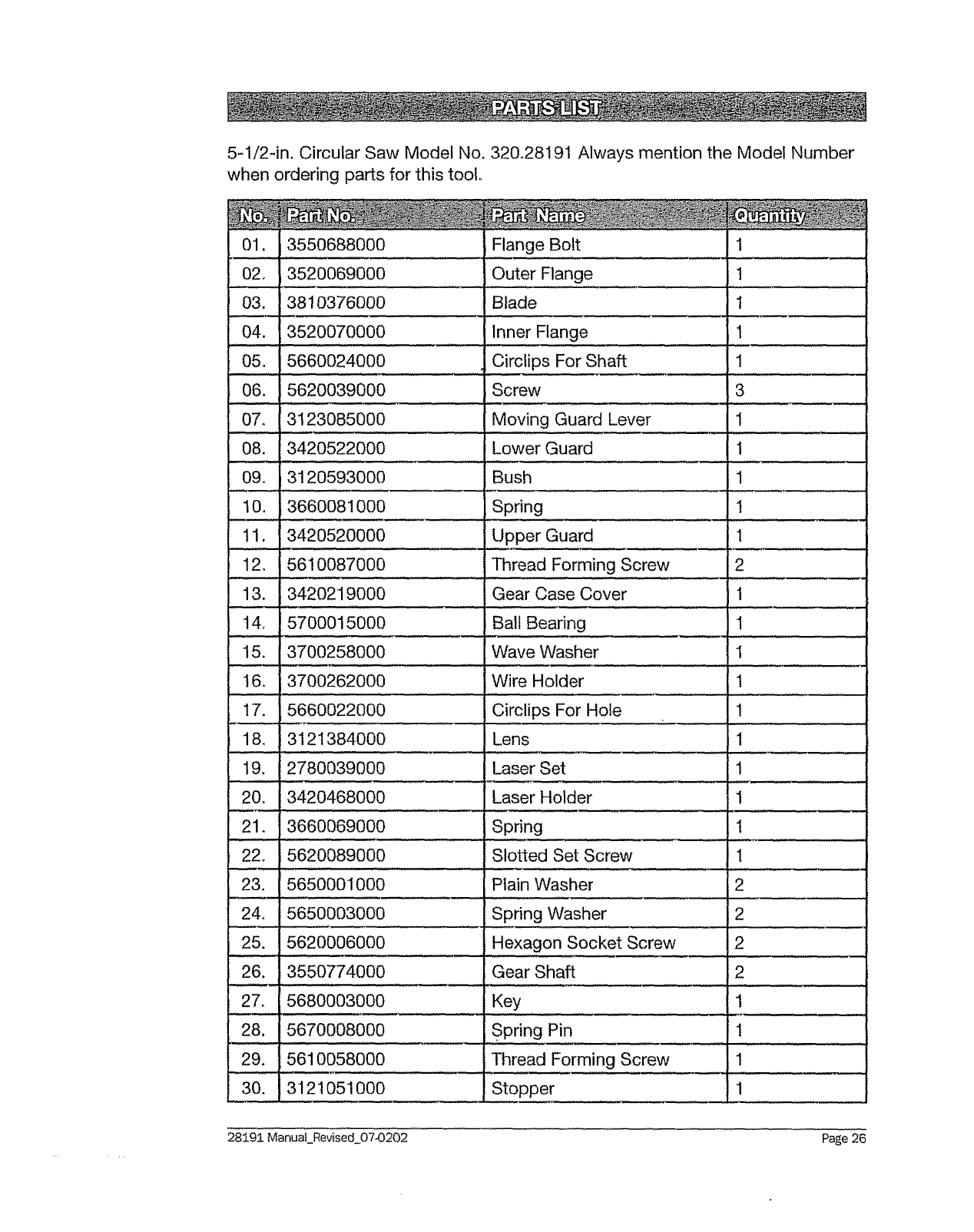
5_1/2-in. Circular Saw Model No. 320.28191 Always mention the Model Number
when ordering parts for this tool,,
01. 3550688000 Flange Bolt 1
02_ 3520069000 Outer Flange t
03, 3810376000 Blade 1
04. 3520070000 Inner Flange 1
05. 5660024000 Circlips For Shaft 1
,,, , ,,,...... _.................... ..., ,,,.....
06. 5620039000 Screw
....... ,,,, ,,,,,.... ,,,,,....
07° 3123085000 Moving Guard Lever
08. 3420522000 Lower Guard
09. 3120593000
10. 3660081000
11. 3420520000
12. 5610087000
Bush
..,,,,,,
Spring
Upper Guard .. ,, ,,.........
Thread Forming Screw
13. 3420219000 Gear Case Cover
14. 5700015000 Ball Bearing
i5. 3700258000 Wave Washer
......... *,*,,,,,,,,...... ,,,,,,,, i ,,, , ,,,,
t6o 3700262000 Wire Holder
......................... ,, ,,.............. , , ,,,,,,,,_....
17. 5660022000 Circlips For Hole
18. 3121384000 Lens
19. 2780039000 Laser Set
20., 3420468000 Laser Holder 1
, , ,,, _ ............... i , ,,,_,, ,,,,
21, 3660069000 Spring 1
-,, ,,,, ,,, ,,,,,,,,,
22° 5620089000 Slotted Set Screw
,,, ,,
23. 565000'1000 Plain Washer
........... ,...... ,,,,,,
24° 5650003000 Spring Washer
i,,,,,,,, ..... ,,,,, ....
25. 5620006000 Hexagon Socket Screw
26. 3550774000 Gear Shaft
: .... ,,, ..... ,,, ,,, ,,,,,,,, ,
27° 5680003000 Key 1
28. 5670008000 Spring Pin 1
29, 5610058000 Thread Forming Screw 1
3_3_3_01J31!2105_1000 Stopper
3
1
1
1
I
1
1
I
t
1
1
1
1
2
2
2
2
, ,,,,, •...............
1
28191 ManuaLRevised 07-0202 Page 26
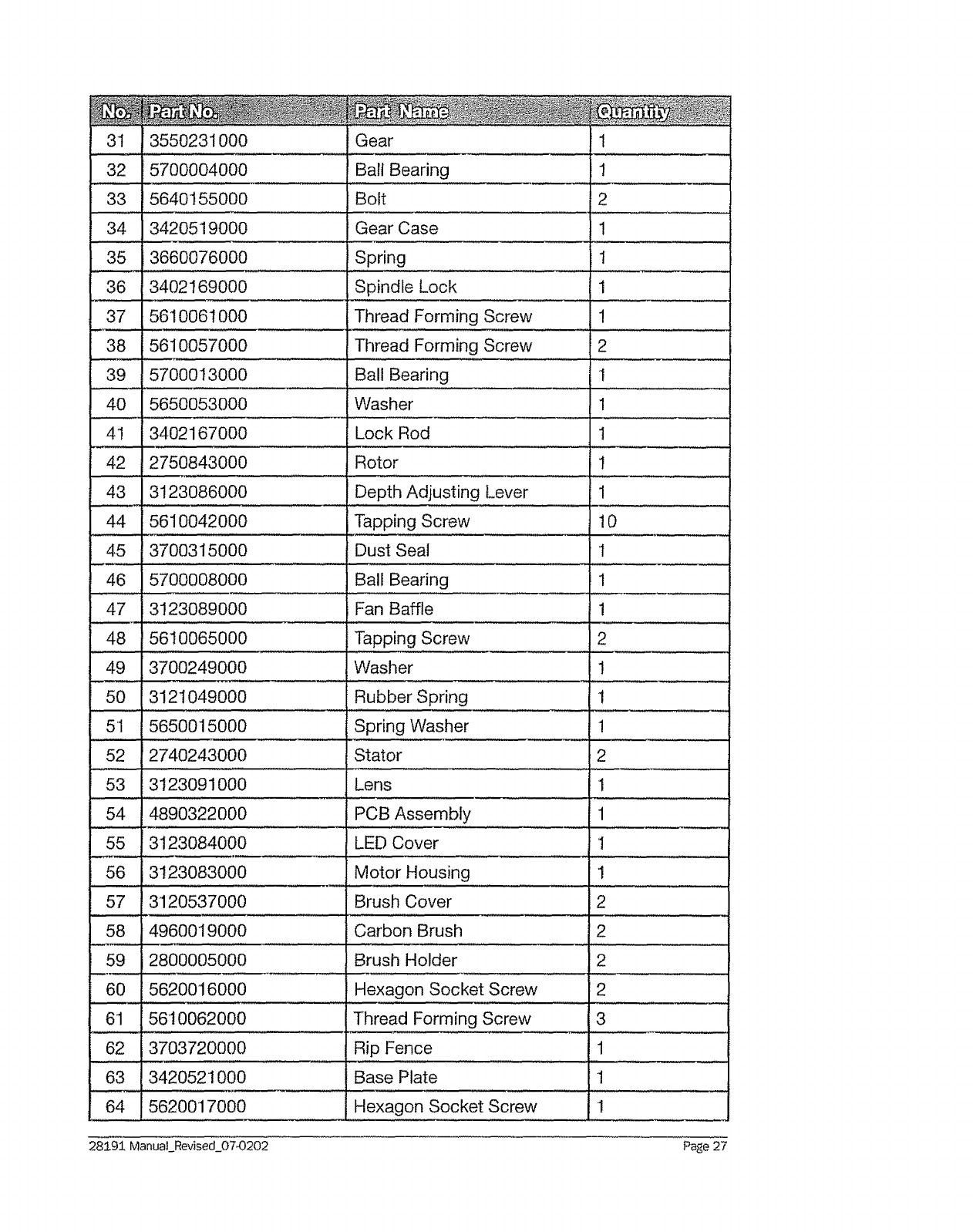
35
31 3550231000 Gear
........ ,,,,,,,,,,, , = ......
32 5700004000 Ball Bearing
33 5640155000 Bolt
34 3420519000 Gear Case
,,uu,,,,, , ,............. ,,
3660076000
36 3402169000
37 5610061000
38 5610057000
"_ 57000'13000
40 5650053000
5610042000
3700315000
41 3402167000
42 2750843000
43 3123086000
44
46
47
5700008000
...... ,,,,,,,,,, ,
3123089000
5610065000
370024900049
50
5'1 5650015000
52 2740243000
53 3123091000
'54 4890322000
55 3123084000
56 3123083000
57
3121049O0O
3'120537000
,,, ,,,,,,, ....
4960019000
2800O0500O
5620016000
5610062000
3703720000
,,,,,.......
342052t 000
Lock Rod
........... ,,, ,,,,,, i .......
Rotor
58
59
60
61
62
63
,,,,, ..... ,,,j,,,,,,, ,
64 5620017000
1
1
2
!
Spring 1
,,,,,,,,, ,,,,, ......
Spindle Lock 1
Thread Forming Screw 1
Thread Forming Screw 2
Ball Bearing 1
Washer 1
Depth Adjusting Lever
Tapping Screw
Dust Seal
Ball Bearing
............. ,,,,,,
Fan Baffle
...... ,,,,,,,,,
Tapping Screw
Washer
Rubber Spring
Spring Washer
Stator
Lens
PCB Assembly
LED Cover
Motor Housing
Brush Cover
1
1
10
1
,,,,,,,,,,, _ ....
1
,, ,__ .,_,_
1
2
1
1
2
1
1
1
,,,,,,
1
2
2
2
......... .,,,
2
3
1
1
Carbon Brush
Brush Holder
Hexagon Socket Screw
Thread Forming Screw
Rip Fence
Base Plate
Hexagon Socket Screw
28191 ManuaLRevised_O743202 Page 27
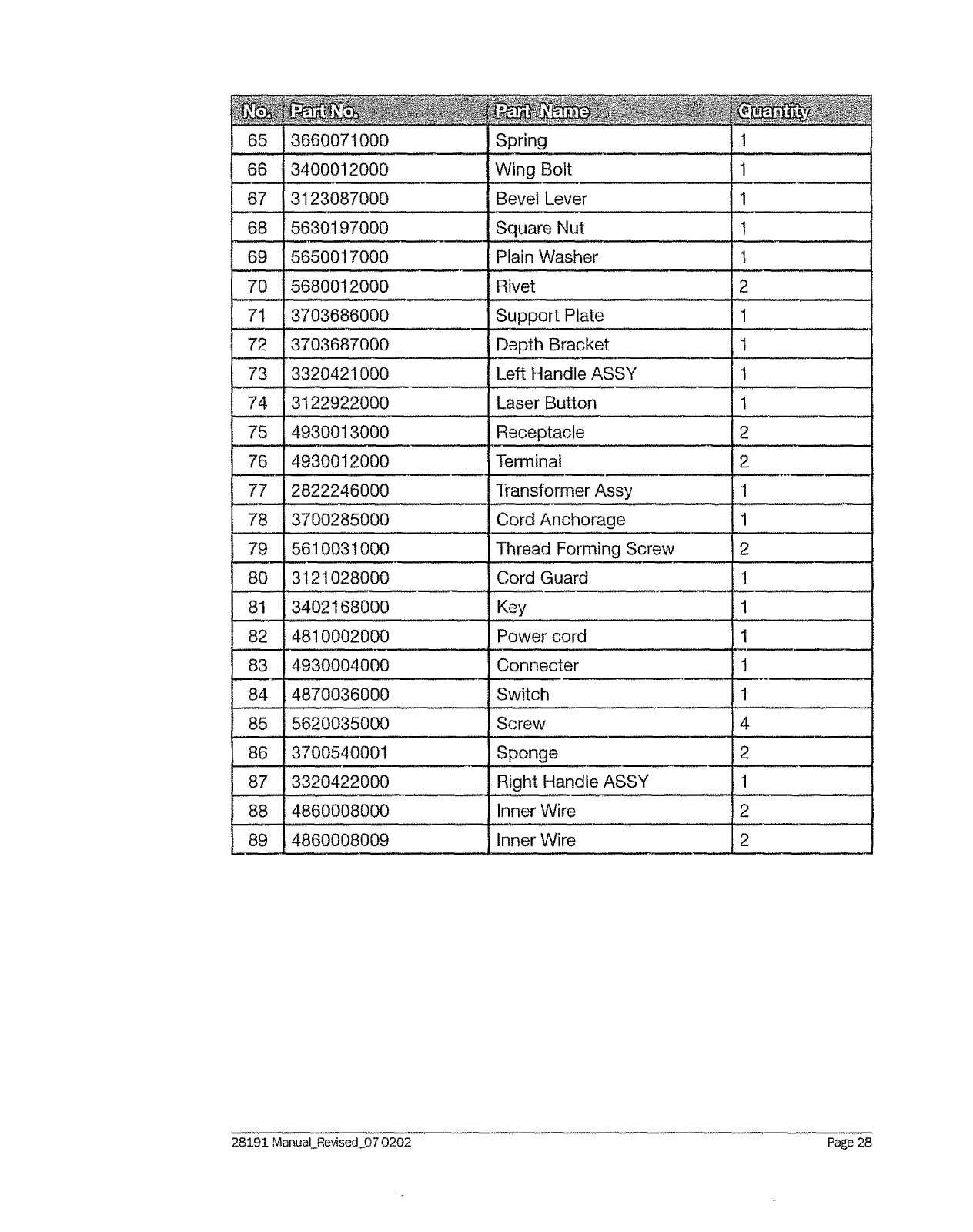
65 3660071000
66 3400012000
67 3123087000
_6; 5630197000 .......
6; ........ ;65001111701;0
70 5680012000
--7it i3703686000
72 3703687000
73 3320421000
Spring 1
Wing Bolt 1
Bevel Lever 1
•, ,,,,,,,,, ..... ,,,,,,, = .......
Square Nut 1
Rivet 2
Support Plate 1
L,
Depth Bracket
Left Handle ASSY
1
1
74 3122922000
75 4930013000
76 4930012000
77 2822246000
78 3700285000
79 5610031000
80 3121028000
Laser Button t
Receptacle 2
Terminal 2
Transformer Assy 1
Cord Anchorage 1
Thread Forming Screw 2
Cord Guard 1
81 3402168000
82 4810002000
83 4930004000
84 4870036000
85 5620035000
86 3700540001
87 3320422000
88 4860008000
...... 89 114860008009
Key 1
Power cord 1
,.,,.
Connecter 1
Switch 1
..... • . ,,,,,, ....... ,,,, ......
Screw 4
, ,.,,,,,,,
Sponge 2
. ---- , i ,,,........ , ,,,,,,,,-,......
• Right Handle ASSY
Inner Wire
1
2
Inner Wi_ 2
28191 ManuaLRevised 074)202 Page 28
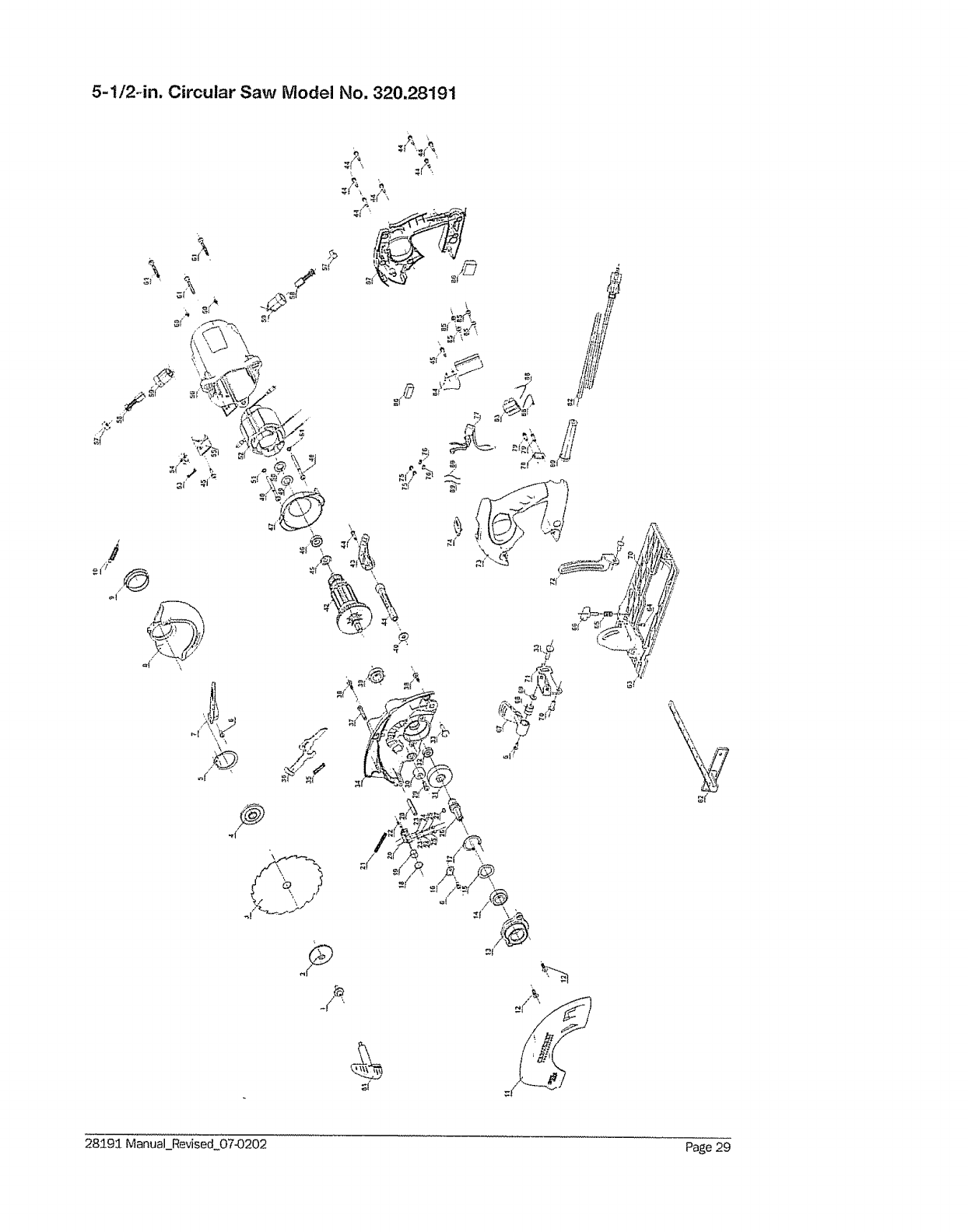
5-1/2-in. Circular Saw Model No, 320.28191
28191 Manual_Revised 07-0202 Page 29

28191Manual_Revised07-0202 Page30
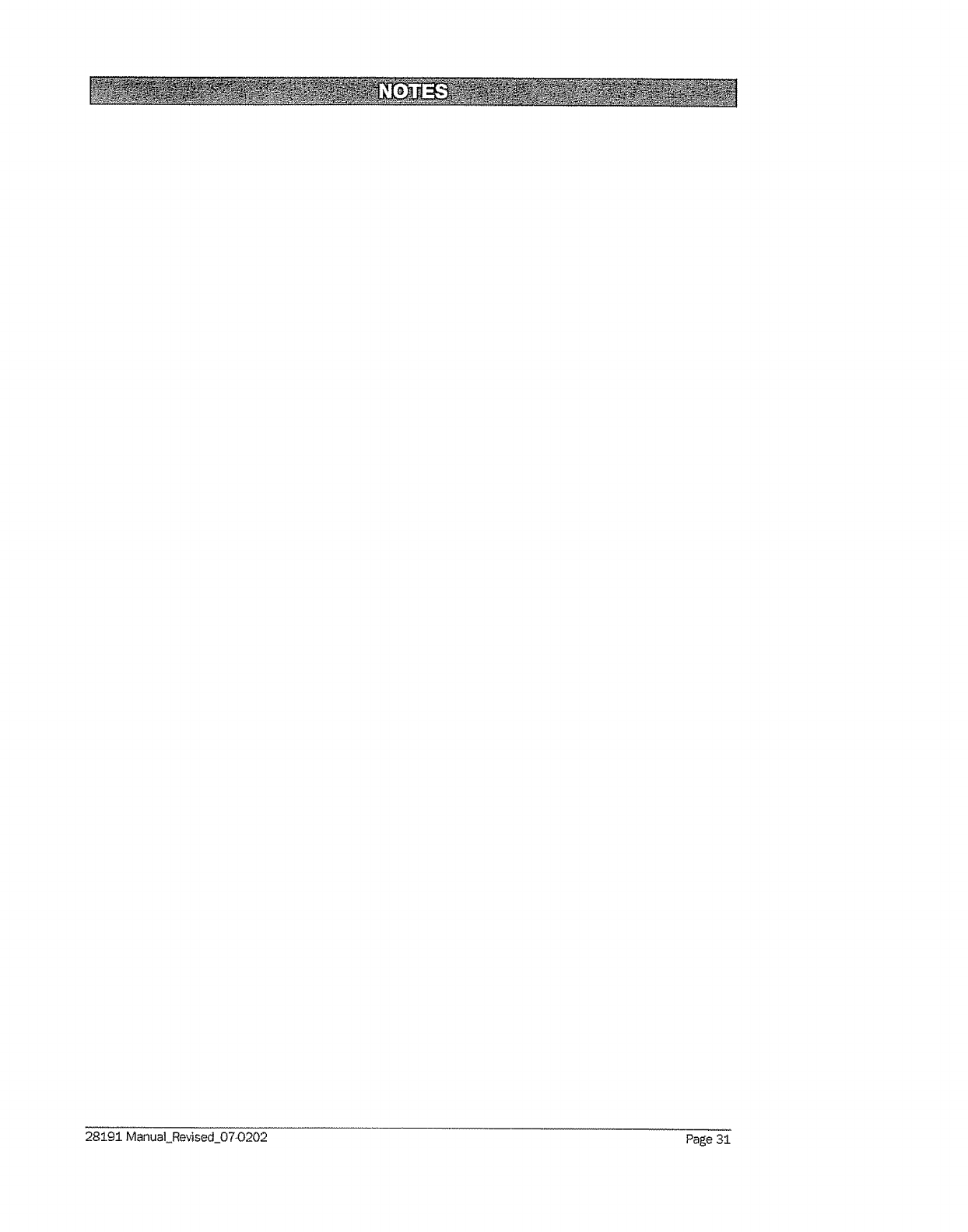
28191ManualRevised_07_202 Page31
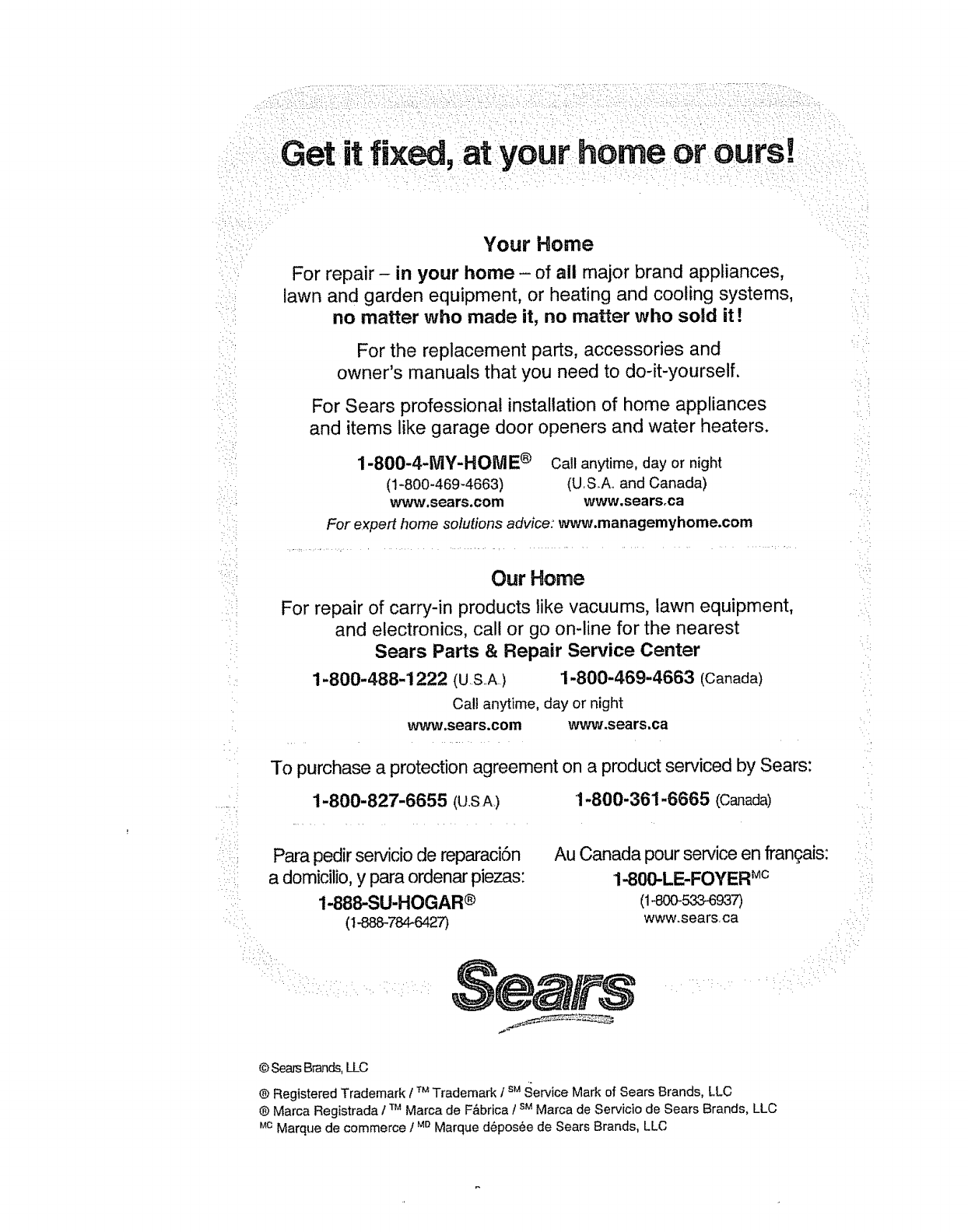
Get it fixed, at your home or ours!
Your Home
For repair - in your home - of all major brand appliances,
lawn and garden equipment, or heating and cooling systems,
no matter who made it, no matter who sold it !
For the replacement parts, accessories and
owner's manuals that you need to do-it-yourself.
For Sears professional installation of home appliances
and items like garage door openers and water heaters.
1-800-4-MY-HOiVlE ®Call anytime, day or night
(1-800-469-4663) (U,S.A and Canada)
www.sears.com www.sears.ca
For e_pert home solutions advice:' www.managemyhome.com
Our Home
For repair of carry-in products like vacuums, lawn equipment,
and electronics, call or go on-line for the nearest
Sears Parts &Repair Service Center
1-800-488-1222 (U S.A ) 1-800-469-4663 (Canada)
Call anytime, day or night
www.sears.com www.sears.ca
To purchase a protection agreement on a product serviced by Sears:
1-800-827-6655 (us A) 1-800-361-6665 (Canada)
Para pedir servicio de reparaci6n
a domicilio, y para ordenar piezas:
1-888-SU-HOGAR®
(1-888-7844427)
Au Canada pour service en frangais:
1-800-LE-FOYER Mc
(1-80o-5334937)
www.sears ca
Sce /rs
© SearsBrands,HC
® Registered Trademark tTMTrademark tst_Service Mark of Sears Brands, LLC
® Marca Registrada 1TMMarca de F&brica /SMMarca de Servicio de Sears Brands, LLC
McMarque de commerce /MDMarque d6pos6e de Sears Brands, LLC